Don't wanna be here? Send us removal request.
Text
Remakes often attract a lot of ire from movie lovers, more so, when attempts are made to recreate a film that has already obtained cult status among viewers. It is, therefore, not shocking to know that Hrithik Roshan had flatly refused to be a part of the new Agneepath when producer Karan Johar had initially approached him with the project. He was certain that it would be impossible to re-enact the character of Vijay Dinanath Chauhan after Mr. Bachchan had left his inimitable mark upon it in the original version. And his fears were not baseless! Agneepath had widely been regarded as one of Mr. Bachchan's greatest performances by critics and audience alike since the film’s release in 1990. He had also received a National award for his performance.
Stepping into the shoes of a stalwart like Mr. Bachchan would have been scary enough, but to recreate a performance that had become iconic over time must have seemed unfeasible to Hrithik at the time. Thank Goodness for Karan Malhotra who convinced him to accept the role through his amazing script reading. Also, thanks to Karan Johar for insisting Hrithik to listen to his namesake in the first place. Had Hrithik not done Agneepath, he would have divested the audience of a bravura performance that once again proved his mettle as a great subtle actor; a performance that perhaps surpassed even that of Mr. Bachchan's.
The new Agneepath was a sleeker version of its predecessor, packaged with more gloss, and yet, efficiently retaining the grimness required for plot credibility. A mammoth cast comprising the likes of the late Rishi Kapoor, Sanjay Dutt, Priyanka Chopra and Om Puri alongside Hrithik not only lent the project the much needed star value but also ensured that it became one of the most well acted films in Bollywood during recent times. The original story was retained in its basics and some alterations were made to enhance the plot, the most important of them being the introduction of Rauf Lala (played with delicious malice by the wonderful Shri Rishi Kapur, ironically an actor always known for playing lovable good boys). Priyanka’s character, Kali, was also a modified version of Mary, and in our opinion, far more significant. The core theme of revenge remained the same; in fact, if anything, it played an even more important role in the new version. Perhaps it was Karan Malhotra who summed up the story best. During the making of the film, he talked about the only advice he had given Hrithik while shooting it- he had asked the latter to bear in mind that Viju’s sole reason of existence was revenge and that the audience should know it by seeing him, no matter what the scene was. Hrithik did precisely that and how! This was also probably why the new Agneepath seemed darker and gloomier than the older version- in the original, Vijay was willing to die for revenge; in the new one, he knew that death was inevitable and yet did not care. While Mr. Bachchan’s Vijay was content to send Kancha to jail and was only forced to be violent with him by the latter’s continued misdeeds, Hrithik’s Vijay was far more brutal, and single-minded; nothing short of Kancha’s death could quell his rage. Although neither of us are vindictive in nature, we confess that Vijay’s absolute ruthlessness in the remake appealed much more to our sensibilities than his attitude in the original; there was an intense poignancy in his rage and thirst for revenge which perfectly complemented the gritty undertones of the film and tugged at our heartstrings.
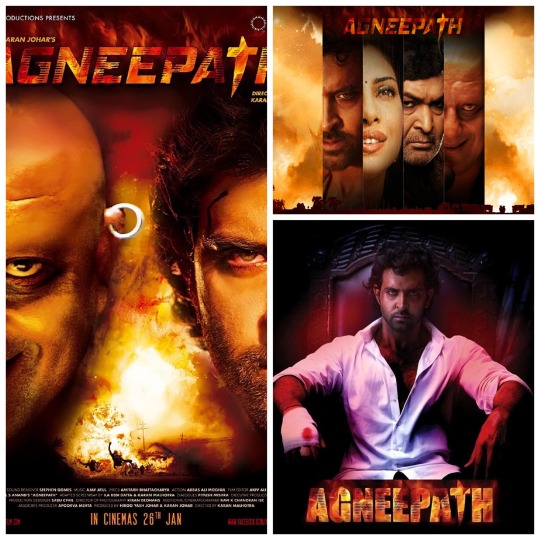
Of course, poignancy is not a novel concept in revenge movies; in fact, one might argue that it is actually integral to them. Why, then, must we consider this element as a particularly important quality in Karan Malhotra’s Agneepath? Speaking only for ourselves (as nothing outside that falls under our justifiable purview), the grief Agneepath engendered in the hearts of its viewers was always more overwhelming than the anger; it was probably that which enabled the new version to create a niche of its own. And, it was primarily Vijay’s character who embodied that impenetrable and indestructible grief. Following his director’s suggestion, Hrithik portrayed Vijay as someone whose eyes always depicted the finality of his decision to obliterate Kancha and his evil empire from the face of this earth; but being an intelligent actor who is always exploring the nuances of any character he plays, Hrithik did not stop there, and added grief into the brilliant mix of anger and ruthlessness he was supposed to show- the kind of grief that left lumps in throats, and wrenched guts.
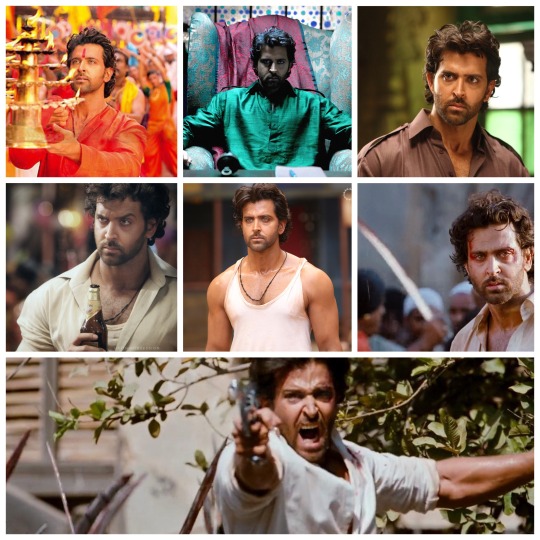
Vijay was probably one of the most simple characters to be written, and also one of the most complicated. Ironic much? Well, yes! His simplicity obviously lay in how his entire life was driven and defined by his mission; however, underneath that rough exterior, there was a complex maze of emotions that he kept suppressed. This was a guy, willing to associate with a child trafficker and drug smuggler in order to reach Kancha, but only because there was no other way to do so. On one hand, he would sell cocaine and kill rival gang men without batting an eyelid; on the other, he would donate all his money to the needy, almost as if he was atoning for the sinful ways in which he had earned it. It would have been much easier for Karan Malhotra to depict Vijay as being involved in other less heinous crimes but commendably, he chose to go ahead with a hero who was flawed enough to use Rauf Lala’s smuggling business in order to fulfil his personal revenge and not apologize for the pernicious manner in which he destroyed the former’s entire family despite feeling obvious guilt. It was this boldness which once again separated the new version from the older one. Vijay had simultaneously become more cunning and more vulnerable in the modern Agneepath, which was a remarkable feat to achieve, courtesy of Hrithik Roshan, an actor par excellence.

This blog can turn into a whole book if we begin to elaborate on all the moments that Hrithik had given us to cherish from Agneepath, and yet, it seems hardly possible to leave out any. Anyone out there who hasn’t yet watched the movie? Well, probably not! In case you haven’t and happen to come across this blog, watch Vijay’s subdued disappointment mixed with helplessness at Kali’s hopes of a wedding in one of the initial scenes of the film. In that moment alone, Hrithik gave an idea of the level of subtlety he was about to wrap his performance with in the rest of the film. This reached another level as Vijay tried to catch a glimpse of his younger sister Shiksha on her fifteenth birthday. The craving etched upon his face was indeed a sight to behold. Trying to peek at her from a distance, his face depicted a vulnerability that would engender grief in a heart of stone. The moment when Shiksha caught him keeping a cake and a bouquet of flowers at her doorstep was simultaneously one of the most endearing and heart-wrenching moments in the film on account of the palpable softness of Hrithik’s countenance in this scene. Agatha Christie, the ace mystery writer, had famously pointed out in one of her books that a great actor should have the ability to change their facial expressions in such a manner that they could acquire a whole new personality even without putting on a disguise. In Agneepath, Hrithik did precisely that, transforming himself into a child, yearning for the love and affection of his mother and sister (after the former had severed ties with him fifteen years ago due to his entry into the world of crime and kept the latter in dark about the existence of her only brother) in one moment and bringing a steely resolve for revenge into his beautiful grey-green eyes in another. He was the epitome of subtlety in this film, conveying Vijay’s rage, grief, determination and pain with his terrific expressive eyes most of the time, instead of relying on wordy dialogues. His portrayal of a drunken Vijay, wallowing in grief, away from his family was so real and completely devoid of melodramatic over the top gestures commonly seen in bollywood during drunk scenes, that it could be used as a masterclass for beginners in drunk acting. Watch him dance to ‘Gunguna re’ while drunk, and you will marvel at his level of dedication for his art. It was definitely not Hrithik Roshan dancing, but a drunk Vijay doing the honours.

Vijay’s takeover of Lala’s empire, first by taking a bullet for Lala’s elder son Mazhar (a bullet that Vijay’s men fired) and then by luring Mazhar into a well-set trap leading to his eventual death, was a track made more thrilling and emotional by Hrithik’s pitch-perfect portrayal of guile and guilt simultaneously. His emotive prowess was put to test by the director during the scene of Mazhar’s death during which Vijay was supposed to feel remorse for his actions while stage managing his murder, and Hrithik not only passed with flying colours, but set a benchmark for through this scene. He proved once again that it was subtlety that always left the strongest marks, rather than ham acting, something mainstream bollywood had often failed to recognize. When his eyes exuded both grief and fire as Vijay watched Lala suffer a heart attack triggered by the trauma of his son’s death, viewers like us were left amazed by his ability to convey such layered emotions solely through his eyes. He delivered a similar stupendous performance when Vijay had his first conversation with Kancha on phone. What a moment it was! With fury and immense anguish raging across his entire body, Vijay made a monumental effort to control himself so that Kancha did not realize who he was speaking to. Hrithik Roshan and his eye expressions! We are truly running out of adjectives to describe his performance.
Vijay’s return to Mandwa and his first adult face to face encounter with Kancha was another feather in Hrithik’s already heavily adorned cap. They were also directorial masterpieces. The scene where Vijay approached Mandwa and the island loomed into view was one of the most iconic moments in the film. Mandwa signified everything that Vijay still lived for. It was not just his birthplace, but also his father’s legacy- a legacy that had been hijacked by Kancha; a land that was being bled to death by him. And it was up to Vijay to reclaim Mandwa from its destructor. It was up to him to reclaim his birthland from his destroyer. A special mention for the way Karan Malhotra and his team chose to depict Mandwa! The grey undertones and rugged terrain of Mandwa perfectly symbolized Kancha’s reign of terror, and accentuated his evilness to fuel the imaginations of the audience. Mandwa, rightfully evoked gory memories of past in Vijay thereby giving Hrithik yet another opportunity of displaying rage, hate as well as grief at once, all the while ensuring that Vijay’s emotions remained unknown to Kancha and his gang. Hrithik’s expressions of horror, palpable fear and utter disgust at being hugged by Kancha after the latter had just hung a person on the same tree from which he had hung Vijay’s father still induces goosebumps in us. In this context, a mention must be made about Sanjay Dutt, who proved to be a brilliant choice for Kancha. His gigantic physique, coupled with the evil sneer upon his face was the perfect look for someone as vile as Kancha, and he engendered hate among the audience in every scene, just as the character was supposed to. The Mandwa track also offered the song ‘Chikni Chameli’ , which, in our opinion remains Katrina’s best dance performance till date. However, personally, we think, the best moments of the film followed this track.

The scene in which Rauf Lala (after regaining consciousness and discovering Vijay’s betrayal) tried to sell Shiksha in an open market was meant to curl the blood of every viewer who watched it, and it did. What do we say about Rishi Kapur? He was a true revelation in this film. Of course, we were well aware of his skills as an accomplished actor, but that he could play the role of an evil pimp with such flawlessness was something he himself was unsure about while signing the film. Hats off to him. Unfortunately, an untimely death has deprived both bollywood and its audience of such an ace actor. His dialogue delivery in the afore-mentioned scene instilled exactly the same emotions in us as it did in Vijay who reached the venue to stop the heinous crime and save his little sister.
Hrithik’s walk as Vijay entered the venue, shooting Lala’s aides who stood in his way, eyes seething with wild, raw fury, proved that he was the only one among the existing generation of actors who could pull of the ‘angry hero’ image with as much magnificence and elan as Mr. Bachchan. His expressions when Vijay knew that he had no choice but to kill Lala (he was trying to spare his life probably out of his guilt for killing Mazhar) after the latter had committed sacrilege by making lewd remarks about Shiksha, who was young enough to be his daughter, was one if cold fury and determination, and he was worth watching. His transformation a few seconds later when his mother was forced to reveal his identity to Shiksha into the vulnerable Viju was testimony to his range as an actor.
The next few minutes that followed shall stand out, at least in our minds, among the all time best moments of bollywood. Excuse us for the length of this blog but ‘Abhi Mujhme Kahin’ needs at least one complete paragraph, devoted to it. Sonu Nigam! Thank Goodness that Ajay-Atul offered the song to him, and kudos to them for 'Abhi Mujhme Kahin' along with the other brilliant songs and background music in the film. Sonu’s voice, Amitabha Bhattacharya’s lyrics, Hrithik’s expressions and Karan Malhotra’s direction converted a song into arguably the most important scene of the movie. ‘Abhi Mujhme Kahin’ was not only an expression of Vijay’s joy at being accepted by his sister, but also of his catharsis due of it. Writing anything more about Hrithik’s emotive ability will probably be redundant at this point but please bear with us. Without elaborating much, so as not to bore anyone, let us just give few examples of his exquisite performance- first, the moment when Vijay blew bubbles with Shiksha and Kali (the expression of pure relief as he blew the bubble- relief from the relentless torment of his childhood and youth was such a spectacular bit of nuance that only as subtle an actor as Hrithik could portray effectively). Second, the part when he pushed Shiksha’s giantwheel (the unadulterated joy on his face still brings a lump in the throat; his eyes and smile flawlessly expressed the line ‘mar jau ya jee loon zara’. The fact that Vijay was living his entire life in those little moments, because he knew that he had been gifted with only a brief window of light, and eventually would have to continue his journey towards unavoidable death was portrayed by Hrithik only through his eyes, smile and body language. What a feat!). Next, the bit when he ran with Shiksha and Kali along the beach, splashing water upon them, thereby expressing the emotions of a man who had been happy after fifteen long years only through his run (almost like the great late Smita Patil ji expressed emotions by that famous run in ‘Bhumika’). And finally, the scene at the dinner table proved that he was as brilliant with words as he was with his expressions. The monologue about who his father was and why he himself was still alive was delivered exactly the way it should have in a situation like that; the silent gaze towards his mother, expressing craving, love and resentment and the break-down in front of Kali while eating the food prepared by her were once again gloriously performed. But, do we expect any less from him?

Ever since the remake with Hrithik had been announced, every one who had seen the original film had been wondering if and how its most iconic dialogue would be inserted in the new version. You are right. Its the ‘Naam Vijay Chauhan’ scene that is on our mind. Kudos to Karan Malhotra for not only retaining Agneepath’s signature dialogue in its remake but also for managing to make the scene more significant than the original. In the older version, the famous dialogue was used as Vijay Dinanath’s Chauhan introduction. Karan Malhotra used it to reveal Vijay’s identity to Kancha, thereby making the scene more impactful than its predecessor. As far as the performances are concerned, we can safely declare that Hrithik was as powerful in his delivery as the actor of the millenium, Mr. Bachchan himself. Also, Pankaj Tripathi deserves to be mentioned here. In one of his very early roles as a film actor, he gave us a glimpse of his massive talent through the slightly perverted, blood thirsty character of Surya, one of Kancha’s prime aides. His performance in the above mentioned scene was so realistic that it felt as if he was truly being struck hard with a knife repeatedly. Hrithik’s ruthlessness as he killed Surya to save the one person who reminded him of his father and had believed in him despite being a highly decorated honest police officer (played by the great Mr. Om Puri with his usual magnetic charm) was unparalleled.

We have almost reached the climax. But just before it, Karan Malhotra decided that Vijay’s story was not traumatic enough! So, he chose to take Kali’s life after presenting us with two beautiful scenes between Hrithik and Priyanka in which the latter, who did not have a lot of screen space in the film, got a chance to show her histrionic skills. Priyanka Chopra is undoubtedly one of the most natural actresses in the industry. Kali’s breakdown after she realized that it was time for Vijay to face his destiny which must inevitably result in his end was effortlessly portrayed by Priyanka. Like every great actor, Hrithik knew when to let his co-star take centre stage. He did precisely that by allowing Priyanka to take the charge in this scene, and provided her with impeccable support through his mostly silent expressions. The proposal could not have been more romantic and the terrific chemistry between the lead pair was perfectly displayed by the director with the soulful ‘meri adhoori kahaani’ at the backdrop. Kali’s pure child like joy at her wedding was a treat to watch, making the next moment even more disturbing for the audience. However, no matter how angry it might have made the audience, Karan Malhotra definitely did not make Kali die right after her wedding with Vijay for sadistic purposes. He did it to make his film better. And he was successful in his endeavour. Hrishikesh Mukjerjee’s Anand famously asked, ‘Udaasi khoobsurat nahin hoti Babumoshai?’ He was so right. In the original film, Mary survived but the fact that Kali died made her character unforgettable. Kali’s death also served two other purposes. First, it gave Hrithik another chance of grief portrayal in which he was obviously phenomenal; second, it gave Vijay yet another trigger to face Kancha once and for all. His reiterations of ‘tu mat ja Kali..tu mat ja’ followed by that soul shattering scream expressing pain and rage truly touched every viewer to the core.

Having lost his only stable companion and the love of his life, Vijay finally went back to Mandwa in order to have a final confrontation with Kancha, leading to possibly one of the goriest climaxes in bollywood. The audience literally flinched in the theatres when Kancha savagely thrashed Vijay around in front of his kidnapped mother and sister at Mandwa. All praises to the action director, and the actors for making every punch look real. Hrithik’s portrayal of physical pain was absolutely flawless, and hence extremely painful to watch.
By this time, the enslaved masses of the place had realized their grave mistake and unjust behaviour towards Dinanath Chauhan and his family. To their and Vijay’s mother’s amazement, Vijay finally managed to overtake the physically stronger Kancha by the sheer force of his will power and the indomitable urge for revenge, hanging him the same way the tyrant had hung thousands of others. And as he completed his life’s mission, he recited the poem he used to recite as a child with his father- Agneepath. Thanks to the stalwart poet Sri Harivansh Rai Bachchan for this amazing piece of poetry. Kudos to Hrithik for his flawless delivery. And after meting out the much deserved punishment to Kancha, and freeing his motherland from the latter’s tyranny, Vijay succumbed to his injuries. Laying on his mother’s lap, Vijay asked her with child like urgency if he had done the right thing, making the viewers weep bucketful of tears. And Suhasini finally accepted what she had known all along. She told her dying son that she would pray to God for another life as his mother, and no one else’s. As Vijay hallucinated his father beckoning to him, there was an expression of unmitigated serenity on his face. After all, he had fulfilled his destiny. He had reclaimed Mandwa and delivered it to its inhabitants. He had saved his father’s legacy. And he was finally, going to a far far better place than he had ever known- a place where he would be united with his father and Kali. Could there have been a better end to this terrific film?
4 notes
·
View notes
Text
Whether or not God exists is one perpetual conundrum, but even the most hardened atheists of this world are rarely able to disclaim the significance of fate in life. What plausible reason other than misfortune accounts for the countless failures thousands of people encounter regularly in various spheres of life despite never making a mistake of their own? None. How else can a sane person explain why some individuals are born privileged while other similar ones are forced to suffer incessantly amidst abject poverty until death relieves them of their sufferings? Cruel, you say? Well, undoubtedly so. One person’s good luck so often brings misery to someone else.
This is exactly what happens in Zoya Akhtar’s debut directorial film, ‘Luck, by Chance’ when a photograph of the protagonist Vikram Jaisingh is selected purely ‘by chance’ for the lead role in a film and that of his at least as talented (if not more) friend Abhimanyu’s is missed. One random action, and Vikram rises to glory in the magical kingdom of Bollywood! Fortunately or unfortunately, this is true of innumerable ‘Vikrams’ and ‘Abhimanyus’ in the real world. Notwithstanding the massive amounts of effort that people involved with film-making put in every day, the vital role played by ‘luck’ in the industry can hardly be ignored. And Zoya is not scared to showcase it in her very first venture. She juxtaposes Vikram’s dream ride masterfully with Sona’s nightmare in Bollywood and allows the uncomfortable truth about brutal fate to reverberate unabashedly throughout her film. It is this hard hitting honesty that makes ‘Luck by Chance’ one of the best chronicles of the Hindi film industry during recent times.
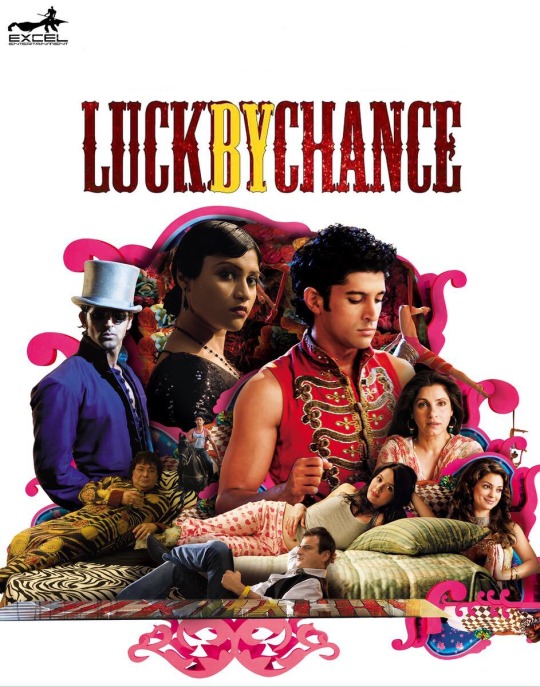
Just like her later films, here Zoya presents the audience with a vast gamut of characters that add exquisite flavours to her concoction, thereby making it all the more memorable for them. The mix includes a shrewd producer, an ageing, conceited, yester-year, her impulsive as well as ambitious daughter, an incompetent director, an egotistical superstar, a self-centered newcomer and a talented, hardworking, but exploited young actress among several others. Farhan Akhtar and Konkona Sen Sharma lead this brilliant ensemble which includes some of Bollywood’s most respected names such as the late Rishi Kapur, Dimple Kapadia, Juhi Chawla, Sanjay Kapur, Isha Sharvani and last but definitely, not the least, Hrithik Roshan.
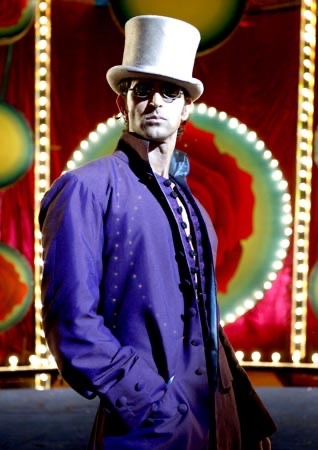
It is this last name and the character he plays that we are going to focus upon in the present blog. Of course, the film itself deserves a complete blog but since this project started as a celebration of Hrithik’s works, we deemed it best to maintain our initial objective. Perhaps once we have completed analyzing all Hrithik’s films, we can come back to this very special one and dedicate a separate blog to it.
Hrithik plays Zafar Khan in Luck by Chance, the quintessential Bollywood superstar. Suavity, good looks, charm, talent- Zafar has everything in abundance. He is also completely human, filled with the baser human emotions of envy, guile and selfishness. It is Zafar who backs out at the last moment from the film of his mentor (Rishi Kapur) because he finds greener pastures. He does so without much concern for the massive loss that his producer might incur, the same producer who had given him footing in Bollywood. But, as Zafar points out to his secretary, he is tired of being ‘owned’ by the man. Incidentally, it is this specific moment wherein Zoya decides to portray Zafar’s softer side. Stuck at a traffic signal, Zafar finds few street urchins flocking near his luxury car and what follows is one of the most endearing scenes Bollywood has ever produced. The pure joy on the faces of the children as they see the superstar ‘up close and personal’ is heart-touching. And so is Zafar’s reaction to them! Instead of being irritated or throwing tantrums which might be expected from stereotypical stars, Zafar engages with the kids in his own way, making them happier with every little interaction. In that instant, he is as pure a human being as is possible for anyone to be. Zoya masterfully manages to reveal that Zafar is neither a monster nor an angel, only a common human being filled with both positives and negatives, through this very subtle and apparently trivial moment. The closed window of Zafar’s car which acts as a barrier between him and the children is a metaphorical representation of the class divide that prevails not only in ours but every ‘civilized’ society across the world. It is also a symbol of the boundary that separates a superstar from his common fans; a boundary that is often impossible to cross even if someone is willing to. Only a director of Zoya’s calibre can be expected to convey so many hard realities through a scene that lasts for about a minute. As flawless with his expressions as ever, Hrithik is superlative in this scene as the humane Zafar.
Talking about expressions, Luck by Chance also contained ‘Baawre’ which definitely ranks among Hrithik’s top dance performances in our list, not just because of his moves but more importantly, due to his countenance and attitude. Hrithik is phenomenal in this song and it is an out and out ‘paisa vasool’ performance. One other scene that deserves to be mentioned in the context of Hrithik’s acting is the interaction between Zafar and Karan Johar at a party during which the latter discloses to Zafar how stars are made. It is all a matter of the same old ‘luck’. A reigning star refuses to do a film and some newcomer gets a chance. Luck by Chance! Of course, whether or not he is able to utilize that opportunity depends on the individual’s talent, but destiny does come first. Hrithik’s conveyance of Zafar’s jealousy as he realizes that he has created his own competitor unwittingly is absolutely on the spot. All in all, Zafar Khan is possibly one of the most impactful extended cameos Hindi cinema has ever seen, and all thanks to Zoya and Hrithik for that.
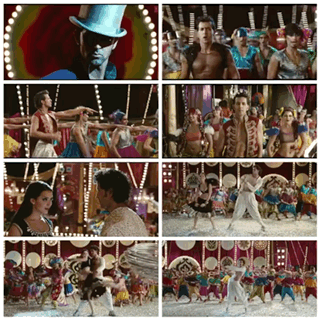
Incidentally, Hrithik also played notable guest roles in two other films. One of them was directed by none other than Zoya’s brother Farhan. Hrithik starred as none other but Don himself in a scene with the stunning Priyanka Chopra. Well, it was the Don (Shahrukh) in Hrithik’s mask. Looking dapper in a suit, Hrithik walked right into the hearts of the audience as he twirled with Priyanka on the dance floor. Farhan was clever enough to make use of Hrithik and Priyanka’s terrific on-screen chemistry in that one scene and they sizzled together. The other film in which he did a cameo was Vikram Phadnis’s Hrudayantar. He donned Krrish’s attire once more there to give a few moments of happiness to a dying child. The scene between him and the little girl was truly gut-wrenching.
With that, we bid goodbye to our lovely friends with a promise that the break shall be a short one. Thanks for being patient with us.♥️♥️♥️♥️
5 notes
·
View notes
Text
“Der lagi lekin maine ab hai jeena seekh liya
Jaise bhi ho din maine ab hai jeena seekh liya
Ab maine yeh jaana hai, khushi hai kya, gumm kya
Dono hi, do pal ki hai ruttein na yeh thehre na rukey
Zindagi do rangon se bane ab roothe ab mane
Yehi toh hai, yehi toh hai, yahaan…….”

There is no better teacher than life- this is a saying that does not just serve the purpose of filling greeting cards; rather, it is a universally acknowledged truth. The onus is upon individuals to imbibe whatever they can and apply it in their personal contexts. However, sometimes, one needs a helping hand. A loving look, a caring touch and an assuring voice are all that people often require to get over hurdles and uncertainties. Although this realization may come from any quarter, the eternal support of like-minded friends is indispensable to ultimate contentment in the voyage of life. On this note, let us dig into a tale which has recently completed ten glorious years in Bollywood- a tale that completely identifies with the philosophy we just stated. The tale in question is obviously none other than Zoya Akhtar's 'jewel in the crown' Zindagi Na Milegi Dobara (ZNMD). But of course, you already know that. Do you remember the moment in the film when a drunk Arjun (Hrithik Roshan) expresses his disappointment over the impending conclusion of his vacation with best pals Kabir (Abhay Deol) and Imran (Farhan Akhtar)? Minutes later, he gets embroiled in a group fight with a complete stranger and lands up in a Spanish jail with his friends. A week ago, this would have been virtually impossible for the usually prim and proper Arjun. This is the essence of the film we are about to celebrate today. It is a fantastic journey of life that these three protagonists make to discover and, in some cases, re-discover themselves. Such journeys bless us with rapture in its purest form by sprinkling the right amount of pixie dust and create memories that last a lifetime. They pop up anytime out of everything and nothing and soak our souls with unparalleled happiness. Zoya’s message is simple and clear. It is all there in the title itself. There is just one life, and if you cannot make the most of it, time will eventually run out leaving nothing but emptiness behind.
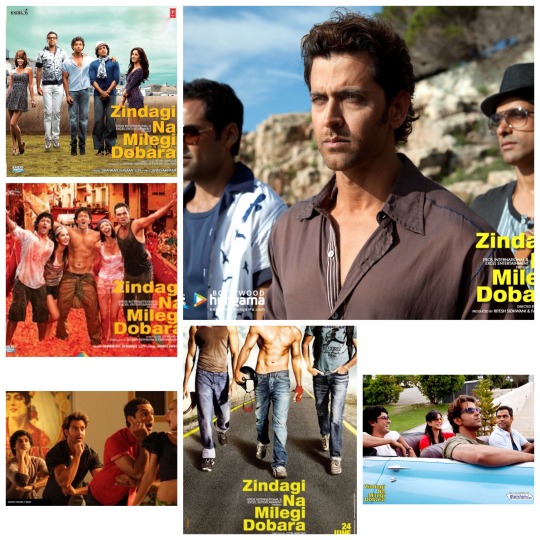
ZIndagi Na Milegi Dobara is all about true friendship and how it has the ability to not just heal scars but also solve problems which probably cannot be resolved otherwise. Kabir, Imran and Arjun, known as the three musketeers among family and acquaintances, are friends since school. In college, they had made a pact that they would go on a road trip for their bachelors’ party instead of celebrating it conventionally whenever one of them decided to get married. The film sets the mood right at the prologue which reveals the characters of our beloved protagonists, at least to some extent; while Kabir and Imran are enjoying at the former's engagement party, Arjun is away in London at his office, busy with 'money'. Even before the opening credits start rolling out, the audience already understands that Kabir and Imran are fun loving while Arjun is a workaholic. They realize that for Kabir, this trip with his two best friends means something more than just a vacation. They also know about Imran’s hidden agenda behind choosing Spain as the location for their adventure. And they know Arjun is upset over a failed relationship, as well as something else that happened four years ago which doesnot allow him to agree for this trip initially. Yet, he finally concedes because Kabir tells him that even at present, he has only two friends- him and Imran. This is the best part of the film- the unadulterated relationship that these three share!

As soon as they embark upon the trip, the layers begin to get unravelled. Arjun is obviously distant from Imran and the latter seems to be trying to breach an invisible wall between them, albeit with little success. The reason is revealed soon in a scene which is an excellent example of Zoya Akhtar’s sheer genius. Irritated with the continuous work calls that Arjun keeps on receiving while they are travelling, Kabir casually remarks that someone should throw his phone out of the window. The ever cheeky and occasionally irresponsible Imran does precisely that. What follows is absolute cinematic brilliance.
Zoya Akhtar's brilliant craftsmanship is at display here as she makes a magnificently smooth transition from comedy to angst and back to humour in the same scene. She is immensely aided in this by her three actors- Hrithik Roshan, Farhan Akhtar and Abhay Deol. Hrithik is at his best as Arjun finally blurts out what has been simmering inside him since the last four years. One can completely relate to his anger and frustration with Imran as he rants about how it is not funny to throw his phone away, and about how it was not funny to be involved with his girlfriend. Now we know the reason behind Arjun's detachment with Imran. Farhan is equally good as the half apologetic Imran who still believes that it really was not that big a deal, although he is truly sorry for breaking his friend's heart. His callousness is played with such perfection that viewers probably feel like hitting him every time they watch this scene. At the same time, there is something so lovable in Imran that it is impossible to stay angry with him for long. Abhay Deol plays the 'judge' because 'aur koun hai yahan pe?'. Indeed, who else is there?! And he does it wonderfully. His awkward expressions as his best friends argue with each other bitterly are so real that as a viewer, one can actually feel his embarrassment in the situation. Incidentally, it is he who delivers the funniest line in the sequence while schooling Arjun and Imran. As Arjun asks him angrily what 'BPL' means, he explains it with a wry face; Hrithik's expression is priceless here. This scene is indeed one of a kind and hats off to both Zoya Akhtar and Reema Kagti for conceiving it.

By now everyone including the audience feels that it's time for Arjun to let go. For God’s sake, the guy actually takes out a vest and a tie in the middle of a road and starts a video conference with his client. Surrounded by the gorgeous Spanish scenery, he looks so incongruous that just the vision is enough to evoke bouts of laughter amidst the viewers. No wonder Kabir gets irritated with the next caller and asks Imran to throw the disturbing device out. And we have just described what happens next. It is Laila, played beautifully by Katrina Kaif, who comes to everyone’s rescue. She is a fashion student based in London who takes a break every three months to work as a diving instructor in various sea resorts across the world. What a fabulous life, ain’t it? Well, Kabir definitely believes so which does not go well with Natasha but more of that later. For now, let us concentrate on Arjun.

We have all heard the saying ‘opposites attract’, and Arjun is as different from Laila as chalk is from cheese. He lives in a box while she is truly free. But shouldn’t a person live in a box only after death? Laila thinks so and she tells him that as they lie side by side on an open ground under a starry sky. The newfound peace on Arjun's face as he watches her hold his hand makes one all mushy inside and you wonder if it's the magic of the direction, the writing or the actor that is responsible for it. Our opinion is that it is a combination of all the three.

However, this is not the first time Arjun finds peace. That happens a few scenes earlier after he has completed his first deep sea dive. Arjun has a deep-rooted phobia for water, and he does not know how to swim. Nevertheless, as per their college pact, each of the three would choose an adventure sport, and no matter what it was, the others would participate. When Kabir lets his friends know that he has chosen deep sea diving, Arjun is angry and determined not to engage in it. Yet, he accompanies his freinds the next day to meet their new diving instructor. These little subtleties that the writers introduce in the script make ZNMD one of the best friendship movies ever made in Bollywood, if not the best. The fact that Arjun does not stay back is a proof of his respect towards the pact, and hence, their friendship; that is also why despite not being comfortable with Imran anymore, he agrees for the trip. Of course, when he sees the diving instructor, there is just no way he can back off! After all, she is the same girl he was allured with earlier on the beach, so much so that he chose staring at her over working on his laptop! We do realize that is not an appropriate yardstick for measuring attraction in most cases, but Arjun is a guy who carries his laptop on a beach while holidaying with his best friends; so, it is a pretty big deal for him. Laila obviously attracts Imran’s attention too, and the latter does not waste a nanosecond in flirting with her, much to Arjun’s chagrin. However, she seems most interested in the boring workaholic financial trader among the trio despite being clearly appalled by his ideas about marriage and money! The ways of the heart are indeed odd!
This mutual allurement further magnifies as Laila spends time with the three to teach them diving. And then comes the moment we were talking about earlier. After he manages to glide past the shining waters gracefully with Laila’s guidance, Arjun cannot help but cry. These tears are neither of sadness nor of joy; there are some moments in life which are so profound and transformative that they can be expressed only with tears.
“Pighle neelam sa behta hua ye sama
Neeli-Neeli si khamoshiyaan
Na kahin hai zameen, na kahin Aasmaan
Sarsarati hui tehniyaan, pattiyaan
Keh raheen hai ki bas ek tum ho yahaan
Sirf main hoon
Meri saansein hain aur meri dhadkanein
Aisi gehraiyaan, aisi tanhaiyaan
Aur main sirf main
Apne hone par mujhko yaqeen aa gaya….”
Nothing describes this moment and the reason behind Arjun’s solace better than these beautiful words penned by the brilliant Javed Akhtar and recited with equal passion by none other than Farhan himself. In the film, these are shown to be Imran’s unpublished poems and they lend immense depth to the scenes, sometimes even more than the dialogues. Hrithik’s face here is a mixture of serenity, relief, disbelief and that inexplicable emotion which produces tears during life changing events such as these. In this moment, he truly understands his whole existence. And he is worth watching! Call us biased if you want to but Hrithik Roshan has the most expressive face in Bollywood. If Javed Akhtar uses words to create poems, Hrithik uses his expressions to the same end; truly he is pure poetry in motion during this sequence.
Arjun gradually begins to revert back to his original self after this incident and it is such a joy to watch him! He readily agrees to join Laila at the Tomatina festival and finally realizes that life is not to be taken for granted; of course it is Laila who makes him aware about that through her lifestyle, actions and words. ‘Seize the day’, she tells him when he rambles on about how he has planned to retire at 40 and then enjoy life. It is to her that he opens up about his father dying before time and leaving his mother and him behind amidst a ton of debt. That is how we know the reason behind Arjun’s need for money, and also his inferiority complex regarding it. In this context, excuse us for taking a moment to talk about Hrithik’s fantastic performance in the scenes where he exhibits the said complex. Whether it is his casually gloating remark to Imran (‘Teri salary bhi itni nahin hogi’) or his urge to repay Kabir (‘Bachpan se teri gaari mein baitha hoon, ab meri baari hai), this is a completely new Hrithik Roshan that we see here. Never before had he been so human and flawed; we know that the man himself believes this to be true. His ruthless, almost cruel sarcasm towards Imran is so real that you actually feel bad for the latter. We can only hope that we get to see Hrithik in such a role again.
While Arjun and Laila’s proximity continues to increase, the reverse happens in the life of his friend Kabir. It is indeed a disgrace that Abhay Deol is not unanimously considered among the main A-listers in the industry; the man is one of the most natural actors we have. He makes Kabir his own and it is a treat to watch him and the terrific Kalki Koechlin interact with each other in some of the most entertaining parts of the film. Kalki’s Natasha is almost a caricature (in most probably, a deliberate move by Zoya and Reema) but it is to the immense credit of the writers, director and the actress that they make even her believable. She is not actually the evil ‘chudail’ that Imran thinks she is. Despite her possessiveness and snobbery, she is a genuine person and is completely relatable to the viewers, no matter how much they dislike her. Nonetheless, her over-possessiveness is too much for Kabir to handle and the poor guy is perplexed upon discovering this side of his fiancé. The scene wherein Natasha gate-crashes Kabir’s bachelor trip and sees him carrying Laila in his arms is ‘stomach-ache inducing’ hilarious, especially due to Hrithik and Farhan’s expressions. A similar moment occurs a while later when Natasha confidently tells Kabir that he will not be able to go on a road trip with his friends anymore after the wedding. Surely you must have watched both scenes multiple times and laughed till it ached. The argument that Kabir has with Natasha in his hotel room is serious, yet laced with intelligent humour which is such a trademark of Zoya’s direction. A special mention for the moment when Imran discovers ‘Bagwati’ on the floor (Natasha had actually thrown it to hit Kabir) and gasps- Farhan’s performance in ZNMD is probably the only one that can be compared with Aamir’s iconic Akaash from Dil Chahta Hai (completely believable since Farhan was the one who conceptualized that role!). Pardon us for digressing.
Kabir tries his best to hide his relationship problems from his friends but is discovered by both Arjun and Imran. Ironically, it is Arjun who is most concerned about Kabir's woes. This is not the pre-Laila Arjun who had built a wall around himself despite loving and caring for his friends. The rejuvenated one is the old school buddy of Kabir and Imran who is probably the most perceptive out of the three. And it is his somewhat relentless perusal of the matter that ultimately leads to Kabir accepting that he does not really know if he wants to marry Natasha or not. Imran, on the other hand, is extremely awkward at any such conversation and continuously tries to avoid the issue until he cannot. The scene in which they persuade Kabir to take the right decision is one of the best written 'friendship' scenes in the history of Indian cinema. Even here, Zoya and Reema show their comic geniuses as Kabir reveals to his friends that he did not actually intend to propose Natasha and the ring was originally for his mother!🤣🤣🤣🤣 A unique proposal indeed!
As complicated as Kabir’s problem is, Imran is probably going through an even worse time. Fun loving, flirtatious, irresponsible, careless and thoughtless- this is the usual opinion of most people about Imran. What no one except his mother knows about is the burden that he carries around. Farhan is exceptional in portraying Imran’s suppressed poignancy while maintaining his pert exterior. Imran has just come to know that his birth father is someone else instead of his Abbu who has recently expired. He is the son of one Salman Habib, a famous painter settled in Spain; hence the choice of this location. While Farhan is impeccable with his comic timing making the viewers laugh at all his antics, it is his depiction of vulnerability and pain that is absolutely spell-binding. Four scenes stand out among all fabulous ones.

The scene in which Imran bares his heart out to Nuria is where Farhan outdoes even himself. He expresses Imran’s pain through his eyes in this wonderfully written scene. Here, Imran finds it easier to confide in someone who will not even comprehend what he is saying rather than talk to his best friends. It is not unnatural, considering his secretive nature and the circumstances. His relationship with Arjun is a mess and he is not ready to accept the harsh reality of his birth in front of the two people who knows him best. The beauty of the scene lies in how Nuria understands him without actually doing so. Just like love, pain needs no language either. Nuria is also special because she is the first one to realize that in spite of his coolness, he is actually hurting inside. Equally brilliant is the scene in which he finally tells his friends the truth. This is followed by a fantastic few minutes in which Naseeruddin Shah reminds us why he is what he is. Not that we had forgotten anyways! Salman is just like Imran as the brilliantly perceptive Arjun correctly points out. When Imran requests him to tell the truth, Salman asks if there is a thing like that because each one has his own version of it. He then proceeds to give his version of the truth; he does not regret anything in life, not even staying away from his son. And as Imran tells him to apologize only when he is truly sorry, one feels sad for Imran but does not judge Salman. He is not a deserter but just a normal common human being, like most of us are. The scene where Imran truly feels sorry for what he had done to Arjun, and asks for forgiveness is one of our personal favourites in the film. Hrithik and Farhan are outstanding in this. Farhan has more scope here because he is the one who is feeling remorse but Hrithik's subtle expressions of gladness at his friend's gesture and more than that, his sheer love for him leave the viewers speechless. Arjun's eyes and countenance reflect genuine understanding, and an expression of 'I had forgiven you long back' in this sequence. This is the true essence of friendship and Zoya depicts it beautifully in the movie. Farhan is equally wonderful in portraying Imran's heartfelt apology to his best friend. He does not need more than a sentence to convey that his realization is a by-product of Salman’s rejection; his eyes and face do the job perfectly.
As the movie approaches its climax, our three musketeers also understand the true meaning of life. For Arjun, the transformation comes through Laila’s love. They are together and Arjun is tranquill at last, having realized that life must be lived, not spent. While Arjun was the one who needed a ‘live in the moment’ guidance most when the film started, and Imran the least, the latter still gets an important lesson- to accept the reality for what it is because that is absolutely essential for the happy, and stress free. Kabir also finds clarity after the much-needed revelation about Natasha to his friends and gathers the courage to not go ahead with the wedding. The last scene in which the three friends run with the bulls in Spain’s famous sport possibly showcases the most poetic moment of the film. Although they have comprehended the importance of living life to the fullest and being happy, there is always a difference between realization and actual action; the latter requires a conquest over one’s deepest fears which our protagonists still need to do, and as Imran puts it, is there a better way of doing that than conquering the biggest fear of all- death? The part where Kabir, Arjun and Imran decide to re-join the race, eyes conveying to each other their united epiphany, is one of the most inspirational scenes that Bollywood has come up with in recent times. As they run from the bulls defying death, there is such pure joy in those faces that one cannot help but repeat along with Farhan-
“Dilon mein tum apni betabiyan leke chal rahe ho.
Toh zinda ho tum!
Nazar mein khwaabon ki bijliyan leke chal rahe ho
Toh zinda ho tum!
Hawa ke jhonkon ke jaise aazad rehna seekho
Tum ek dariya ke jaise, leharon mein behna seekho
Har ek lamhe se tum milo khole apni baahein
Har ek pal ek naya samaa dekhiye
Jo apni aankhon mein hairaniyan leke chal rahe ho
Toh zinda ho tum!
Dilon mein tum apni betabiyan leke chal rahe ho
Toh zinda ho tum!”
If this is not how everyone should at least strive to live, then what is?
At the risk of sounding redundant, here are a few more words about the actors because frankly, they deserve it. Let us start with the ladies, shall we? Although ZNMD talks primarily about male bonding and maintains its focus on the three guys, Laila and Natasha are not just plot maneuverers but vital characters in themselves. Laila is actually the only person who follows the film’s central philosophy in its minutest detail- she literally lives the way she wants to without worrying about things that ultimately have no significance in the larger cycle of life. Katrina plays the character with aplomb and grace, allowing Laila to develop more through her body language than words. Every time she walks into the frame, the audience knows she is free and someone who lives life according to her choices. She is flawless throughout but especially brilliant in the sequence when Laila decides to follow Arjun and let him know about her feelings. The kiss that happens between them is sizzling not only because of the terrific on-screen chemistry she shares with Hrithik, but also due to Laila’s inherent boldness which Katrina embodies to the core. Watching the girl take the first step and pursue the guy while he is showing restraint, as well as initiating the kiss is a rare occurrence in Hindi cinema but what a welcome change! This is how it ought to be. Decisions regarding love are as much female as male territory.

Creating an impact with lesser screen time than others is always a challenge but not for someone of Kalki’s calibre. She is excellent in every character she does and that is a well-known fact. It is absolutely impossible to visualize a character like Natasha as anyone else but how Kalki portrayed her. She plays Natasha with unbelievable nuance and makes one relate to even someone as unlikeable as her. Her attitude while she drives with the boys to the airport at the pace of a snail, almost kills everyone including herself due to carelessness, and then casually begins to hum ‘I’m a rock chick in a hard rock world’, leaves us in splits every time! The part where Arjun and Imran join her in the song is just an example of how you can never ignore Natasha irrespective of your opinion about her. And kudos to Kalki for portraying that with such amazing conviction.
Now, we come to the men. Since a lot has already been mentioned, we will keep this short. Abhay is a delight to watch from the first moment he enters the frame till the last. His Kabir is both witty and silly as well as classy and goofy at the same time. As difficult as the role sounds, Abhay makes it so effortless that it looks easy. He is often required to underplay considering Kabir’s character (especially because Arjun and Imran are at the two extreme ends) and he does it wonderfully. Underacting is way more difficult than its opposite and only a great actor can do it so well as Abhay does here.
Whether it is cracking silly jokes, playing the fool, flirting with women, suppressing his vulnerability and emotions, confronting Salman or reciting poetry, Farhan is superlative in everything that he does in the film. As Nuria correctly points out, his eyes reflect the inner turmoil Imran is going through even when he is being cheerful on the outside. His interaction with the legendary Naseeruddin Shah is one of the film’s highlights. It is no small feat to hold one’s own in front of an actor of Naseer saab’s level; to actually match him is an achievement worth cherishing, and Farhan does precisely that.

Hrithik proves yet again that he belongs to the rare category of 'megastar’, the occupants of which are far greater actors than stars. He is fantastic as the emotionally unavailable Arjun who has time only for money; he then let himself go with stunning grace as Arjun finally comes to term with his inner self. Just watch him being all chirpy when the three guys are imprisoned, and you will know what we mean. Another instance of this brilliant transformation is the ‘Khwabon ke parinde’ song in which his expressions and body language reflect the pure bliss that Arjun feels after acknowledging his emotions for Laila. You just need to look at him to know that he has rediscovered himself, and is finally free of the shackles that he had worn deliberately for so long. This is also probably the first real opportunity that Hrithik gets to try his hand at subtle comedy, and he is magnificent in it. His rendition of Doordarshan's tune is hands down the funniest moment in this, and in many films.
As far as the chemistry between the actors is concerned, ZNMD does not hit a single false note. Hrithik and Katrina are a fabulous pair and there is a wonderful spontaneity in all their interactions on screen. Arjun and Laila’s wedding moments during the epilogue are some of the most adorable ones in the film. Abhay and Kalki are so good together that even though no one really likes Natasha, it is difficult not to long for them as a couple at the end when Kabir is all alone at Arjun’s wedding. Even Farhan shares a sizzling chemistry with Nuria although she is there for just a few minutes in totality. The main bonding, however, is between the three men, and what a phenomenal bonding it is! The fact that Hrithik, Farhan and Abhay are indeed good friends reflects on screen and takes their chemistry to the level that Aamir-Saif-Akshaye had set with Dil Chahta Hai. The vibes they give off are completely natural and one truly believes that these are three friends on a road trip. Every viewer possibly identifies with some moment between them and is reminded of times spent with their own friends. In conclusion, there are two scenes we would like to leave you with. The first one is the ‘drunk scene’, as we prefer to call it. It is undoubtedly one of the most natural and funny drunk scenes ever shown in Bollywood. Arjun's continuous drunken assertions that everything is written leaves you in splits, and you can relate to Imraan and Kabir's attempts to shut him up. Who knew that a drunk Arjun was such a philosopher?! So much for being a 'money man'! It is also one of the most genuine friendship moments’ that these three shares, which is why we are mentioning it here.

The other scene is basically a moment from the famous sky-diving scene; it is the part where Kabir and Arjun run towards Imran and pull him into an embrace. The joy on all their faces is so pure that it makes you want to cry, somewhat like Arjun who shed tears after the most moving moment of his life (the diving scene). What a magical scene between best pals!
With that we bid you goodbye for now and thank you again for accepting us with open arms because a blog on ZNMD seems like the best platform to extend our heartfelt gratitude to all the lovely new friends that we have made here❤️🤗.
P.S: Hrithik and Abhay also turned singers for this film, and matched voices with Farhan who had already had prior experience. And did they rock it or what! Senorita will be our favourite forever!
14 notes
·
View notes
Text
7th July, 2021 shall go down in history as the day India lost one of her greatest stalwarts, the legend himself- the unimitable Dilip Kumar. Possibly the best actor Indian cinema has ever had, Sri Dilip Kumar was an institution in himself, teaching aspiring actors the art of nuanced acting through his varied works. Originally known as the 'Tragedy King', he excelled equally in comic roles, thereby proving his versatility to the world. Today, we dedicate this special blog to him. If not for 'Mughal-e-Azam', 'Jodha Akbar' would probably remain unmade. Had there been no Dilip Kumar, who would have inspired the next generations?
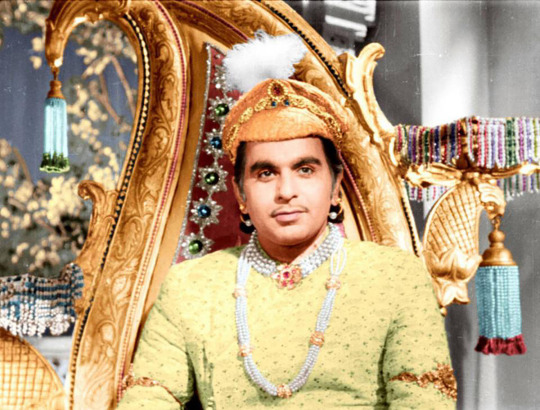
For every movie buff, the dvd release of a favourite film has great significance- the extra reels!! Scenes that were edited out, 'behind the screen' actions, interviews- there is a lot of stuff that we get to watch on the dvds and nowhere else (until some kind soul uploads them 😉😛).. However, a lot of the times, we are left wondering if the dvd was indeed worth our money. Of course, we get to watch the film whenever we want to, but what about the rest? If there is one dvd that gives buyers their money's worth, it is Jodha Akbar.
Ashutosh makes history even here; he is probably the only director who has had to edit out so many fabulous scenes from his film. Others are less unfortunate- they usually edit out unimportant bits, and even if those are good, most of the times, they are dispensable. In Jodha Akbar, most of the deleted scenes seem just the opposite. Once you have seen them, watching the edited version of the film feels somewhat incomplete.
The first scene that comes to mind is 'Jodha talking to her friends about Ratan Singh'. Yes, yes, we do not like Ratan Singh either! However, he is not the reason why we are mentioning this scene here, Jodha is. While the rest of the scene seems totally editable, Jodha's answer to her friend's question about whether she will willingly surrender to Ratan Singh proves that no matter how unimportant a Gowariker scene seems at first, one must never judge before it ends. In the film, we see a bold and opinionated Jodha breaking the stereotypical norms of her society and daring to express her unwillingness to surrender on the very first night. Naturally, when we saw the scene for the first time, we took Jodha's words at face value; we assumed she was not ready because of the forced marriage. However, the deleted scene proves that she would have done the same even for Ratan Singh. She would never have loved someone unless he gave him the resepect she deserved. What a woman!
Next in line is the 'Bidaai' scene, whose essence can literally be summed up in the question that Raja Bharmal's aide asks- 'Ye bidaai hai ya bali?' Jodha indeed is akin to a sacrificial lamb in this scene, and Aishwarya's tears express it all.
Of course, we are interested in Jodha and Akbar's interactions more than anything else, and in all honesty, that was why we all were so impatient for the deleted scenes to come out back then. And thankfully, we do get some unseen moments, although it would be wonderful if the entire 'deleted scene' reel had been just them! 😄😂🤩🥰
Horrified after witnessing Jalal's abject cruelty towards Adham, Jodha confronts her husband and reprimands him for his actions. She is shocked that he never even spared a thought for Maham Anga before taking such a drastic decision. Jalal, however remains adamant as well as furious, and maintains that Adham got what he deserved. Although initially unable to come to terms with it, she soon realizes his reason for doing whatever he did. As a broken and helpless Jalal confesses that if Maham Anga has lost a son, he has lost a father, Jodha understands the agony her husband is going through. Hrithik is brilliant, first as the incandescent Jalal, and then as the heart-broken one. As Jodha places her hand on his shoulder to console him, one can't help but wonder why this scene was edited out of the original reel! What harm would an extra few seconds or even minutes do? 😭
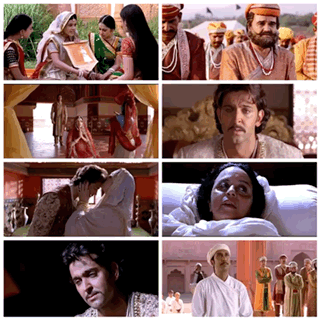
Then comes Mahesh Das aka Birbal. The two scenes through which Ashutosh narrates the history of Mahesh Das's transformation into Birbal are undoubtedly the jewels in the crown of the deleted reel. In the first, Jalal and Jodha meet Mahesh Das who cleverly prevents the emperor from hunting, much to Jodha's pleasure (and ours too). When he claims to know exactly how many birds there are in the land, Jalal tells him that he will be punished if he is wrong. However, Mahesh Das's wit is unparalleled and he rattles a random number. As Jalal and Jodha both look at him with surprise, he explains. If his answer is more than the actual figure, it will mean that birds from the neighbouring land have visited; if less, it will imply that birds from Agra have gone to visit their relatives. Naturally, both the emperor and the queen are impressed. Jalal gives his ring to Mahesh Das and asks him to visit the Deewan-e-Aam.
In the second scene, Mahesh Das visits the Deewan-e-Aam but encounters a corrupt guard who refuses to let common people enter the court without a bribe. When Mahesh Das shows him the emperor's ring, the latter allows him to enter on one condition- Mahesh Das must share half of whatever gift he receives from the emperor with him. Little does he know that he is talking to one of the 'would be' Navratnas of Akbar's court, incidentally one of the most famous ones! Mahesh Das agrees to his condition and asks for a prize of 50 whip shots from Jalal, much to his and evryone else's shock. When he explains the reason for making such a strange request, Jalal calls the guard and orders him to be whipped 50 times instead as a punishment for corruption, which he insists shall have no place in his empire. Fascinated with his wit, Jalal invites Mahesh Das to be a part of the Mughal court. However, Mulla Do-Piyaza objects, and Jalal gives him permission to test the former. If he is able to answer Mulla Do-Piyaza's question, he will be accepted in court. If not, he will be punished. That is the deal. Also, if Mahesh Das wins, then Mulla Do-Piyaza promises to bow before him every day. Jalal agrees, and so does Mahesh Das. After much deliberation, Mulla Do-Piyaza asks Mahesh Das to guess what he is thinking at the moment. Of course, it is an impossible task. However, Mahesh Das is not someone to give up; nor does he need to. His intellect is ready with an answer. He tells the court that at this moment, Mulla Do-Piyaza is praying to the All Mighty for the emperor's long life, good health and prosperity. Is there anything left for Mulla Do-Piyaza to do except accept defeat? 😂😂 Having proved his cleverness to everyone, Mahesh Das attracts appreciation from one and all, and earns a priceless reward from the emperor himself- the name 'Birbal' (meaning quick-witted or 'dimaag mein taaqat'). Having these excellently scripted, directed and enacted scenes in the film would have been worth the extra time!
Two more deleted sequences deserve mention. The first is the moment of Maham Anga's death. Jalal comes to see her as she lies on her death bed, frail and ill. We understand this is the first time he is interacting with her since the betrayal. If not for anything else, this scene should have been included only for Hrithik's exceptional performance, and of course for Ila Arun ji. As Maham Anga finally admits to Jalal that she had wronged Jodha on account of her overpossessiveness for him, and asks him to call him like he used to one last time, we see a completely devastated Jalal, not the Shahenshah of Hindustaan, but just a grieving son. As if she was waiting for that one word from him, Maham Anga passes away the minute Jalal calls her 'Badi Ammi' again. The scene is a strange mixture of melancholia and poeticness, and Hrithik's wonderful emotive capacity makes it one of the best bits of the whole film, both the edited and the unedited versions. On another note, how does someone look so handsome and flawless while sobbing? Is Hrithik even human? 🙄🤨😐😑🤗🤗🤗🤗🤗
The second is the scene when Jalal comes to meet Jodha and his mother before departing for the war with Shareefuddin. Jodha says she is praying for three lives- her husband, her brother Sujamal, and her sister-in- law Bakshi Bano Begum (Shareefuddin's wife). Nonetheless, Jalal vows to protect Amer, no matter what it takes. The scene is poignant and yet another example of the magical on screen chemistry between Hrithik and Aishwarya. Seriously, we deserve them again!!
In conclusion, we reiterate that we would not have minded had the film been half an hour longer due to the inclusion of all the scenes mentioned above
With that, we have come to the end of this blog. Hopefully, you will join us on our next too. Stay safe. Stay well.
Once again, this one is for you Dilip Kumar Saab. You showed the way; so, we have Jodha Akbar. Thank You Sir. May you Rest In Peace 🙏🙏
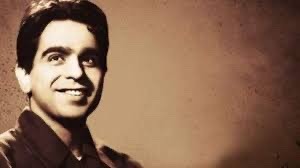
5 notes
·
View notes
Text
As promised, we are back. Hopefully with a bang, but obviously that is for you to decide. It has been a week long interval instead of few minutes; so, without further ado, let us delve back into the lives of Jodha and Akbar.
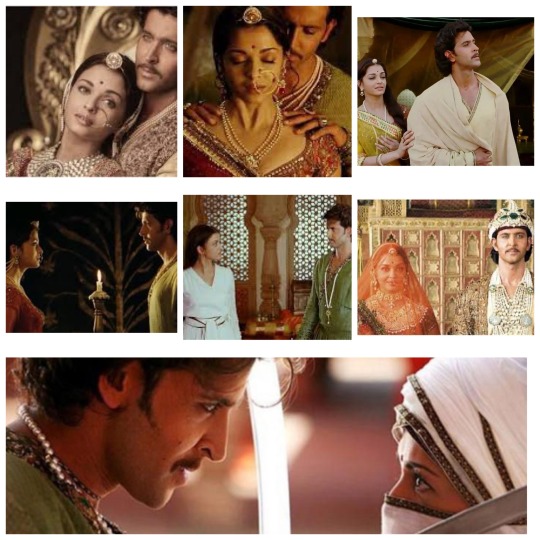
Post intermission, Jalal is neither happy nor content after sending Jodha back to her parental home, and naturally so, since he is already deeply in love with her. He misses her presence in the palace while sauntering wistfully through her rooms which lie vacant now. Being afflicted by the same condition, that is love, Jodha also spends her days and nights in perpetual gloom at Amer. Probably staying away from Jalal has intensified her feelings for him. At the same time, she has never felt more humiliated before.
The person who comes to the rescue of the couple, and especially Jalal, has hitherto always been relegated to a secondary position in his life. She is none other than his mother, Hamida Banu Begum. After patiently tolerating Maham Anga’s shenanigans all these years only to honour Jalal’s faith in the former, she finally breaks silence to protect her son’s marriage. The scene in which Jalal learns of Maham Anga’s betrayal is among the most powerful ones in the film. Both Hrithik and Ila Urun are impeccable as the enraged son and devastated possessive mother respectively; Poonam Sinha is effective as Jalal’s calm but strong-willed mother. The moment when Jalal cautions Maham Anga and commands her to speak with propriety to his mother is one of the numerous examples of Hrithik’s unparalleled fierceness in this project (Khamosh Maham Anga! Humari Ma se neechi awaz mein baat kijiye). Thanks to Ashutosh, this was probably the first film in which the audience got to experience a truly ferocious Hrithik, and what an amazing treat it was! Ila Urun’s helpless gaze and broken gait when Jalal decides never to see Maham Anga’s face again makes one wonder why Bollywood has failed to utilize her immense talent properly till date! She is exceptional throughout the movie, but especially here; her instant transformation from a manipulative and vicious woman to an empty-handed mother is spellbinding, to say the least.

Ashamed at his actions, Jalal ruefully confesses to his mother that he does not know how to face Jodha. She gives him sound advice- acceptance of one’s fault strengthens bonds of love, and that is what Jalal decides to do.
The next fifteen minutes are pure bliss. Anyone admiring subtle intense romance shall cherish these moments forever. As Jalal reaches Amer to bring Jodha back, he is given a grand welcome by her parents as per Rajput customs; there is also a condition- he must find Jodha amidst a host of ‘ghoonghat- covered’ women and if he is able to correctly identify his wife, he may spend the night in her room. Ashutosh directs this scene with his trademark brilliance, making this humorous, romantic and tender, all at once. The fact that Hrithik and Aishwarya are the ones who enact the moments obviously helps. Initially, Jalal makes a mistake; he approaches someone he thinks is Jodha only to realize she is literally shaking in front of him. Naturally, he understands she is not his wife. He achieves success in his second attempt. Once again, without uttering one word, Ashutosh portrays Jodha’s inner strength just by showing her posture, and Aishwarya is flawless in her stance as a brave Rajput princess, who incidentally, is also the Malika-e- Hindustaan. When Jalal raises her veil, he is stunned not only by her beauty but also by the grief and disappointment on her face; as he asks her if she is willing to go back with him, she blatantly refuses. (Of course, it serves him right! Come on Jodha, make him eat his words!). Their conversation in Jodha’s room is the first heart-to-heart between the two. It is also the first time that the two are alone in a room. When he points that out to her, she draws a curtain between them 😂😂. Ironically, this rift between the two has somehow broken barriers between them; Jalal feels emboldened enough to flirt freely with Jodha despite her rage. And she clearly enjoys it. Her slightly embarrassed reaction to his ‘Itni badi saza? Ab aapke chehre ke aaine mein hum apna aks bhi nahin dekh sakte’ is an apt example. What she says to him next is of vital importance. ‘Aap yuddh karke fateh karna jante hain, par raj karna nahin...... Aapne sirf hume haasil kiya hai, hum par fateh ki hai, humara dil nahin jeeta’. While this may be only partially true in the context of their relationship, it is something that Jalal is unable to ignore, as is proved by his actions the next day. But more of that later. As Jodha pretends to sleep, Jalal lifts the curtain, gazes lovingly at her beautiful face and utters a heartfelt ‘Hume maaf kar dijiye Jodha’, unaware that she is listening to him all the while. Her smile, as he goes to bed is an expression of her genuine feelings for him.

The sword-fighting sequence between them next morning is another instance of Gowarikar’s directorial genius; it is as passionate and sensuous as can be expected from an intense romantic sequence, along with being dignified, classy, and subtle at the same time. Jalal witnesses Jodha practising with one of the attendants, and challenges her to beat him. If he wins, she must go back to Agra; if not, she can stay at Amer. Throughout the fight, he is in a playful mood, teasing her at every opportunity he gets; she obviously is completely serious and puts all her energy and effort into the fight, so much so that Jalal has to remind her that he is her husband after all (‘Malika-e-Hindustaan, ye mat bhuliye ki hum aapke suhaag hain’ 🤣🤣). In between the action, Ashutosh expertly incorporates passionate intimate sequences and the tension between them is both palpable and titilating (thanks to the extra-ordinary chemistry between our wonderful leads), although never being anything less than elegant. The moment when Jalal takes off Jodha’s turban and her long beautiful tresses are revealed is probably the highlight of this entire sequence. She looks nothing short of ethereal. Mesmerized, Jalal utters the famous Persian proverb “Az mast ke bar mast chon digari nist “ meaning whatever happens, good or bad, is a result of one’s own actions’ (a line taken from one of the poems of the famous Nasir Khusraw). Jalal possibly thinks he must have done some thing good in life to have met Jodha and married her, hence the comment. The fight is ultimately won by him when Jodha is distracted by a messenger but he does not force her to go back to Agra. He believes she will do that herself once he has won her heart (hum ba Khuda aapka dil jeet chuke honge), something she had found wanting in him the last night.

Jalal leaves for Agra and decides to apply Jodha’s advice not just in his personal but 'professional' life as well. He visits the local market Agra in disguise with his trusted aides, Todar Mal and Mahesh Das, famously known as Birbal, to make himself cognizant of the daily goings on in his kingdom. He does so because he realizes that Jodha is right; in order to be a good ruler, a king must be able to connect emotionally with his people and that is only possible by interacting with them on a personal level. The expressions on Todar Mal’s face when he asks them to call him by name in front of everyone is worth watching. Jalal’s interaction with one of the shopkeepers is laced with fine subtle humour that is so typical of Ashutosh; unaware of who he is talking to, the shopkeeper is rude, and not used to such tone, Jalal thunders away at him in complete emperor mode, ‘Badtameez, jante ho tum kisse mukhatib ho?’. However, he checks himself at the right time, thereby avoiding any disaster.
His secret mission is not just a comic sub-plot in the film; it obviously serves a very important purpose. Jalal finds out that most of his Hindu subjects are displeased with the Mughals and treat them as outsiders. He also hears about the ‘Teerth Yatra Mehsul’, a tax the Hindus are forced to pay whenever they undertake any journey for religious purposes. Outraged at this injustice, he decides to abolish the said tax forever despite facing a strong opposition from the leader of the Ulemas, Sadir Adasi. Nevertheless he remains firm in his decision, unwilling to lead the nation by plundering wealth from the masses. This decision is welcomed unanimously by all his subjects who are finally able to relate to the young emperor and gift him with the name of ‘Akbar’. This monumental event is depicted through the wonderfully picturized, ‘Azeem- o-Shan-Shahansha’, which also marks Jodha’s wilful return to Agra and her reunion with Jalal, now that he has finally conquered her heart.
The entire sequence is breath-taking, and lives up to the standard that is expected from a high budget period film such as this; personally, we believe that this song can only be compared to the legendary ‘Pyaar kiya to darna kya’ from Mughal-e-Azam and nothing else. Everything starting from the costumes and choreography to the detailing of the various kingdoms are flawless. The song itself is trademark Rahman and Akhtar, and no matter what we say about them, it is bound to be redundant.

Unfortunately, these happy times do not last too long because Jalal is shot with a poisonous arrow by an assassin as per a vile plan by his brother-in-law, Shareefuddin. As his life remains in grave danger for several days, we see a distraught Jodha praying for her husband day and night. The scene in which both Jalal’s mother and Jodha pray for him in the same room, but according to their respective customs, is one of the most heart-touching moments in the film and upholds the spirit of religious tolerance perfectly. Jalal finally regains consciousness and is declared out of danger after a torturous wait, much to the relief of Jodha and everyone else in his vicinity, except Shareefuddin and his partner-in-crime, Sadir Adasi, who are naturally enraged at the failure of their devious scheme.

This near fatal experience naturally brings Jalal and Jodha closer to each other than ever before. In a heart-warming moment, Jodha shows Jalal her first effort at Urdu calligraphy and although he praises the beauty of the writing, he is unable to read it due to his illiteracy. She is stunned at the revelation but hesitates to read it out aloud at her husband’s earnest request. When Jalal playfully commands her to do it, she blurts out that a wife does not take her husband’s name. Jalal is amazed to know that the first thing she has learnt to write in Urdu is his name; he wants her to say it aloud by looking into his eyes. And she does so. Jalaluddin Muhammad Akbar. In those days, it truly would have been a very big deal had a wife taken her husband’s name, but this boldness is totally compatible with Gowarikar’s Jodha and Aishwarya portrays her so beautifully.
What follows next is possibly the best written, directed and enacted romantic sequence in Bollywood, and one of the best ever in the history of cinema. Jalal takes Jodha to his room, makes her stand in front of a mirror and waits for the sun to set. The light of the setting sun is reflected by the mirror and the entire room is illuminated brilliantly before darkness prevails; that is the moment Jalal chooses to ask his wife if she loves him. What a gesture! Jodha, as straight-forward as ever, answers in the affirmative, and asks the same question to Jalal. His ‘Hum aapse beintehaan mohabbat karte hain’ never fails to induce goosebumps in us. Sonu Nigam’s magical voice accentuates the charm of this beautiful scene; Hrithik-Aishwarya’s terrific on-screen partnership elevates it to levels hitherto unknown in bollywood (this is obviously our opinion; anyone is free to disagree with it). Their eyes do all the talking, and they express love for each other through their expressions so elegantly that it is impossible to not watch this scene on a loop.

With Jodha and Akbar’s love story attaining fulfillment, we are almost at the finishing line. But of course, Shareefuddin is yet to be tamed. He convinces Sujamal who had joined forces with him to obtain the throne of Amer to launch an attack over it. When Jalal finds out, he advises his father-in-law to sort out differences with Sujamal and reconcile with him. Meanwhile, he decides to tackle Shareefuddin himself. Both forces meet halfway from Amer and Jalal gives one last chance to Shareefuddin for a compromise. The latter agrees for talks, but only to plan Jalal’s murder by sending an intruder into his royal camp in the guise of a guard. Sujamal finds out and tries to warn Jalal but he is injured by Shareefuddin’s men. Eventually, he manages to reach Jalal and reveal to him about Shareefuddin’s plan but he has only a few minutes left. In the meantime, Jodha is already on her way to Jalal and Sujamal because her sister-in-law Bakshi Banu (Shareefuddin’s wife) has informed her of Shareefuddin’s evil plan of killing Sujamal once he has defeated Jalal. Unfortunately, she does not reach until it is too late; Sujamal is on the verge of death. There is a small consolation; before breathing his last, Sujamal is informed by Jalal of Jodha’s innocence that night and the former’s rift with Raja Bharmal is also sorted out. Sujamal makes a prophetic comment regarding how future generations would remember Jalal for his greatness and respectful attitude to Jodha. With his dead body on the floor, Jalal now vows to punish Shareefuddin despite being pained for his little sister too. She asks him to be kind, and he regrets always having to take up the sword against his own kin- first Adham, now Shareefuddin.

Shareefuddin knows winning against the Mughal army is difficult; so, he challenges Jalal to a one-on-one duel and asks the former to leave the throne of Hindustaan willingly in case of a loss. Jalal accepts, much to the worry of his aides and father-in-law. However, he convinces them that this is the best way out as a war would take many lives. He promises that he won’t let the country go into wrong hands (‘Hum Hindustaan ko galat haathon mein nahin jane denge’).
In an excellent display of hand to hand combat and sword fight, both Hrithik and Nikitin Dheer grab eyeballs in the film’s climax. Jalal finally wins, and spares Shareefuddin’s life for his sister’s sake. However, he takes away all privileges from the former and commands him to remain loyal to the Mughal empire for the rest of his life. Sadir Adasi, the traitor is sent away to Mecca after Jalal tells him the importance of treating every religion with respect. What a perfect way to end an epic story!
No amount of words can do justice to what ‘Jodha Akbar’ really is as a film. The fact that this is probably the only movie wherein every deleted scene is as good as the actual film and could have been easily inserted into the main reel, but for time, is a testimony to its quality. We promise to come back with a special thread for the deleted scenes as including them here shall make this blog too lengthy. We reiterate that none other than Ashutosh Gowarikar could have created this masterpiece, and no one else other than Hrithik and Aishwarya could have played the lead characters with such incredible perfection. We thank them along with the entire team for endowing us with this rare and wonderful experience in our lifetime 🙏🏻🙏🏻♥️♥️
14 notes
·
View notes
Text
Film-making, like almost every other creative endeavour, requires not just an incredible level of talent and hard work but also immense fortitude. Naturally, good films are hard to come by. Masterpieces, however, are rare. A movie is most often just a source of entertainment for viewers; at times, it is a medium of abstract communication with actors they admire. However, cinema truly becomes art only when it is able to stimulate the emotions as well as the artistic sensibilities of its audience. And Jodha Akbar does exactly that. It is without an iota of doubt, a masterpiece of the modern era that ought to be watched by art lovers across the world.
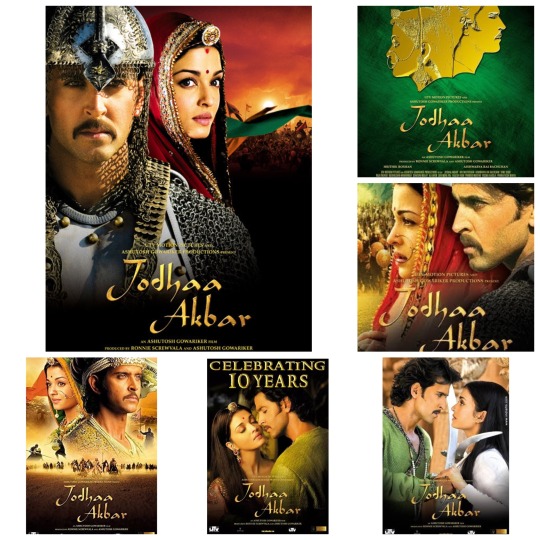
The words ‘Akbar’, ‘Jodha’ and ‘Mughal Empire’, whenever uttered in the context of Indian cinema, have been primarily associated with the all time classic ‘Mughal-e-Azam’. K. Asif’s epic directorial venture of 1960 has remained the benchmark of historical costume dramas in India since its release, not without any reason. Created on a budget of rupees 1.5 crore, considered mammoth six decades ago, Mughal-e-Azam continues to be the greatest Indian blockbuster of all time even today. It amassed roughly 11 crore rupees after its run at the box-office then, which is equivalent to about a massive 2000 crores now. Such is the film’s aura that substantial interest was generated among cine-lovers during the release of its coloured version even as late as in 2004 and 2009. Hence, those were enormous shoes that Ashutosh Gowarikar had to fit in; there was no way of escaping the comparison since the subject matters of both films were too closely related. And because it was Ashutosh Gowarikar, he succeeded.

Not only did he find the perfect story (courtesy of Haider Ali) and draft a soulful script with Haider Ali and K.P. Saxena, he also roped in musical maestro A.R. Rahman and poetic genius Javed Akhtar to take care of the ‘music and lyrics’, two attributes that were required to be absolutely flawless in a period film such as this. While Neeta Lulla’s costumes and accessories made every actor look the part, ace set designer Nitin Desai recreated the Agra and Amer forts at shooting locations with faultless precision. However, all of this could have gone to waste had Ashutosh not been able to get the perfect cast on board. Having Hrithik Roshan and Aishwarya Rai Bachchan as Mughal emperor Akbar and feisty Rajput princess Jodha respectively was nothing short of achieving an ultimate casting coup. And these two were going to be indispensable for the grand success of this colossal project, probably more so than anyone else, except the director himself.
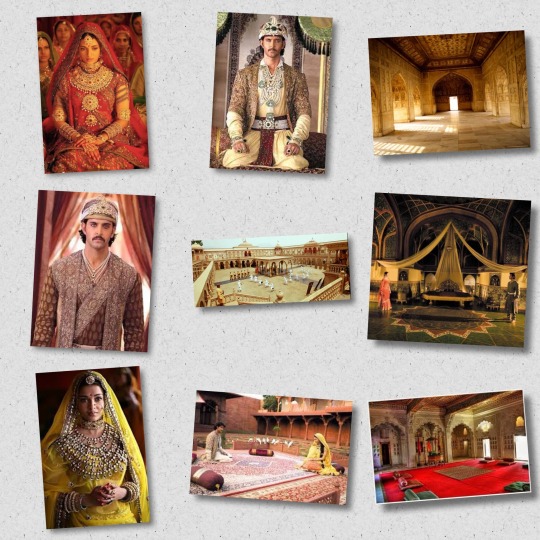
Hrithik Roshan might have already established himself as a terrific nuanced actor in the industry by the time he signed Jodha Akbar but taking on a role which would draw comparisons with the iconic Prithviraj Kapur and the legendary Dilip Kumar himself was a challenge he was yet to undertake. Likewise, Aishwarya Rai Bachchan, despite being the undisputed claimant to the title of the ‘most beautiful woman in the world’ during that time (which she still probably is) had never had her talent and beauty measured against the ethereal Madhubala before. Naturally, the burden of expectations lay as much on their shoulders as their director’s. The task at hand was going to be difficult for both but even more for Hrithik since he would be setting foot into the world of period films for the first time. His co-star had had previous experience from Sanjay Leela Bhansali’s Devdaas and Doug Lefler’s The Last Legion. The Last Legion in particular, deserves to be mentioned in this context because the sword-fighting training that Aishwarya had received for her role in that film probably helped her in Jodha Akbar too.
Despite not having the advantage of prior experience, Hrithik, like a true artist, owned the character of Akbar, making it seem like he had been playing historical characters all his life. His body-language, attitude, diction, voice modulation and movements were so attuned to someone of Akbar's stature that it took real effort to remember that the latter was a separate person. In a promotional interview before the film’s release, Ashutosh Gowarikar revealed how amazing an experience it was for him to see Hrithik get into the skin of the most famous Mughal of all time with an approach that was a combination of preparedness and spontaneity. Aishwarya too gave everything to the role of Jodha, and made this her career best performance since ‘Provoked’. Anyone who has watched ‘Jodha Akbar’ will agree that it is impossible to even imagine other people playing these two characters. If praise of the common man is not credible enough, let it also be known that Dilip Kumar saab himself was impressed by Hrithik’s versatility as an actor after watching the film at a special screening arranged for him by Ashutosh. He also admitted that the film had rekindled memories of the Magnum Opus ‘Mughal-e- Azam’ for him. Aishwarya too received immense praise for her performance as Jodha from critics, audience and industry colleagues alike.
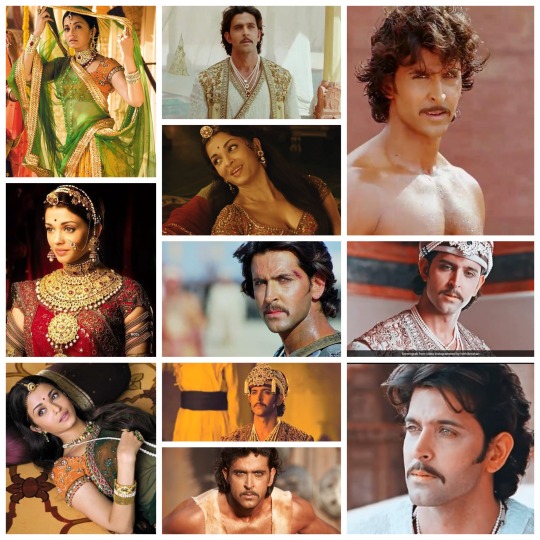
Although comparisons between Mughal- e- Azam and Jodha Akbar were inevitable, it must be noted that both films dealt with very different aspects of Akbar’s life. While the older classic was about the aged Akbar’s conflicted relationship with his son Salim over the latter’s love affair with Anarkali, a courtesan renowned for her exquisite beauty, Gowarikar’s Jodha Akbar depicted the love story between the young emperor and his first wife, the Rajput princess Jodha. The similarity between both films, apart from Akbar and the Mughals, lay in the fact that the identities of both Anarkali and Jodha had been a matter of contention amongst historians since decades. However, staying true to his meticulous nature, Ashutosh correctly issued a statement explaining that it was not his intention to disrespect any one; Jodha was one among the several historically mentioned names of Akbar’s Rajput wife and it had been chosen in the film over the rest due to its considerable popularity among commoners. Ashutosh was also very clear about the love story between Akbar and Jodha being completely fictional since no such account had ever been documented in history. Basically, the film was a fiction set against a historical backdrop, and as far as that setting was concerned, Ashutosh tried to be as accurate as possible, building a story around events that had been recorded in the Akbarnama.
Now that we have given the prelude, it is time to experience the film all over again, and we hope that prospect excites our readers. ‘Jodha Akbar’ opens with the second battle of Panipat that took place in 1556 A.D. between Mughal forces led by the child Emperor Jalaluddin Mohammad’s regent, Bairam Khan, and King Hemu. After defeating the latter, the Mughals were able to recapture the throne of Delhi. The war scenes are all flawlessly directed, keeping in mind the period and style of warfare adopted during that time, something that is naturally expected from a director whose resume boasts of films like ‘Lagaan’ and ‘Swades’. By the time Hrithik appears on the silver screen in one of the most challenging roles of his life, six years have elapsed and Jalal is an adult. Demonstrating his terrific grasp of the character, Hrithik sweeps the audience off their feet as Jalal finally sends Bairam Khan away to Mecca after stopping him from beheading the unarmed defeated opponent, and effectively takes over the administration of ‘Hindustan’ ('Ab apne faisle hum khud lena chahte hain'). Hrithik’s portrayal of Jalal’s suppressed rage as well as authority in this scene was a delight to watch then, and remains so even after all these years. As Jalal plans to annex the entire Rajputana, we are introduced to the other half of the film’s title, princess Jodha. Adept at sword-fighting, having learnt the skill from her cousin Sujamal (played beautifully by the talented Sonu Sood), Gowarikar’s Jodha is the perfect example of ‘beauty with brains’. Aishwarya is as graceful at sword-fighting as she usually is while dancing and imbibes the exact body language required to play a Rajput princess aptly.
Staying loyal to historical facts, Ashutosh Gowarikar depicts Jodha and Jalal’s marriage just as it actually was- a politically motivated alliance. Troubled by Jalal’s over-ambitious brother-in-law Sharifuddin, Jodha’s father, the King of Amer, requests Jalal to marry his daughter so that Amer could obtain Mughal security (In the film, Raja Bharmal of Amer sees Jalal for the first time as he tames a wild elephant in a superbly executed action sequence. Hrithik obviously did it himself, and in order to ensure his safety, he used to feed the said elephant regularly before the shooting of this particular scene took place). Her father’s decision comes as a rude shock to the young Jodha who does not want to compromise her culture after marriage, and is therefore left devastated. Despite not being completely sure about the proposal initially, Jalal eventually agrees to it in front of the Dargah of Khwaja Moinuddin Chisti as he realizes that this inter-faith marriage may be of assistance in promoting religious harmony throughout the country. In a beautiful monologue, he admits to the Khwaja that religious differences were the reason why previous rulers had not been able to establish their rule over the entire ‘Hindustan’; he believes his marriage with Jodha shall solve that problem.
However, Jodha’s decision is yet to come. She is not a stereotypical submissive sixteenth century female, unable to stand up for her own rights. Instead, she is brave enough to summon the Mughal emperor to her tent and lay two conditions in front of him, the fulfilment of which, is mandatory for her agreement with this new association (the famous ‘Humari do maange hain’ scene). First, she does not want to be forced into giving up her religion and customs; second, she wants a temple to be built inside her room in the Mughal palace for her spiritual guide, Lord Krishna. Aishwarya is enthralling in this scene; her calm yet rigid posture and polite yet bold speech are worth watching. Hrithik is simply magnigficent here; no other adjective is suitable enough to describe his phenomenal performance as Jalal hears Jodha out and later recounts the two demands to her relatives and rest of the entourage. He obviously goes on to accept these demands, his respect for Jodha increasing in leaps and bounds at her fearlessness and simplicity (‘Amer ki Rajkumari ke bekhawf jasbe aur saadgi ko hum salaam karte hain’). Naturally, Jodha has no other option left other than agreeing to the marriage.
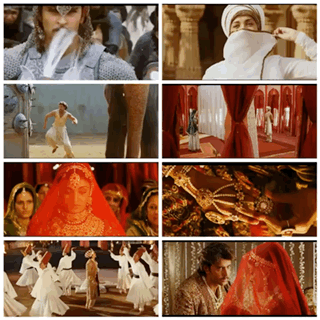
Had the director wanted, the wedding could have been an elaborate dramatic affair, but Ashutosh Gowarikar is not just another director looking for success through gimmicks. The grand wedding sequence lasts only for about a few seconds during which Jodha and Jalal wed each other as per both Hindu and Islamic traditions in an exemplary display of socio-religious amalgamation. Any extra time devoted to this would have been unnecessary and detrimental to the pace of the movie. After the wedding, a group of Sufi singers perform the utterly captivating ‘Khwaja mere Khwaja’, one of A.R. Rahman’s all time best compositions, in probably the most poetic Hindi film sequence of recent times. Such was its impact upon Mr. Bachchan that he termed it the ‘most apocalyptic moment’ in cinema since the great Stanley Kubrik’s ‘2001: A Space Odyssey’. It is not just the song that casts a spell upon the audience during this scene; rather, the direction and acting, in conjunction with the soulful music engender a near hypnotic effect among viewers which last in their minds forever. Hrithik’s expressions as Jalal experiences a spiritual epiphany and joins the Sufis in a trance are simply fascinating. He is a privilege to watch. The scene is an acting masterclass in itself and had he received every existing accolade for this moment alone, it would still not have been unfair.
Jodha and Jalal’s first night together is another instance of the subtlety that this film ceaselessly displays. Jalal, perceptive enough to understand that Jodha’s unyielding attitude towards his romantic gestures is not shyness in disguise, but unwillingness to be with him, has the perfect solution- she is free to leave him if that is what she wants. However, once again giving proof of her simplicity and honesty, Jodha directly confesses that she has no intention whatsoever of walking out of this relationship despite her inhibitions towards it; for her it is an unbreakable bond that shall last unto death. Respecting her wishes, Jalal vows to never be intimate with her against her will. Hrithik and Aishwarya’s acting styles truly compliment Ashutosh’s direction as is evident from this scene among many others in the film; without an ounce of melodrama, they are able to set the stage for an epic love story ridden not just with external impediments but personal inhibitions as well.
The rest of the movie is basically a collection of beautiful moments between the two leads, interspersed with an optimal amount of drama to propel the plot. The first sequence post their marriage that needs to be discussed in detail is the Deewan-E- Aam scene followed by the part wherein Jalal and Jodha see each other's faces without a curtain or ‘ghoonghat’ in between. As Jalal conducts his first hearing at the Deewan-E-Aam after his marriage to the Hindu Jodha, he, quite expectedly, faces opposition from the Ulemas of the court regarding his decision. However, before he is able to solve the problem at hand, the melodious voice of his newly wed bride distracts him, thereby interrupting the court proceedings. The expressions on everyone's face are worth watching as Jalal leaves his throne and begins to walk out of the court, clearly too engrossed to even officially dismiss everyone present. Realization hits him a bit too late, leaving him embarrassed in front of the entire Deewan-E-Aam, but he manages to salvage the situation by uttering an awkward 'Takliya'. This entire scene is once again a brilliant testimony to the skills of the director who expertly incorporates subtle humour in such a serious scene without overdoing any of it or making it seem farcical. Hrithik's performance here is admirable, his comic timing being absolutely flawless. Drawn by Jodha's entrancing voice, Jalal enters her 'Mahal' and they see each other for the first time in what was arguably the most romantic meeting sequence of Bollywood then and has been so since the last two decades. Ashutosh does not provide the actors with any dialogues here, who, therefore, rely completely on facial expressions to convey their feelings towards each other. Hrithik has been a master in expressions since he first entered the industry and in this scene, he is at his nuanced best. But Aishwarya is no less, and that is precisely why their interaction looks so natural and enchanting. With tiny eye gestures and body postures, they express admiration for each other's physical appearance, their eyes speaking a thousand words at once. The part where she wants him to put sindur on her, and he fails to understand initially, is such a wonderful portrayal of his willingness to understand and respect her culture that it strikes a chord with one and all.
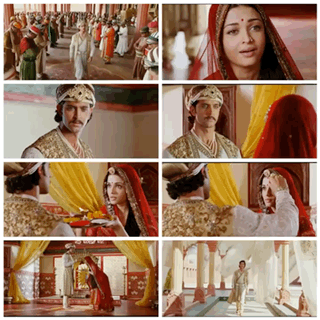
For Jalal, it is almost love at first sight. Though completely smitten by her, he knows instinctively that Jodha is going to take more time, no matter how impressed she is with him. In the next few minutes, Ashutosh shows Jalal and Jodha gradually treading the first steps of love with Javed Ali's mellifluous voice ringing in the background. 'Kehne ko jashn-e-bahara hai, ishq ye dekh ke hairaan hai, phool se khushboo khafa khafa hai gulshan mein, chupa hai koi ranj fiza ki chilman mein'. When the inimitable Javed Akhtar is in charge of lyrics, songs get transformed into dialogues and help the story to march forward. Jashn-e-bahara does just that, and does so exquisitely. It challenges the notion that romantic scenes must always entail physical intimacy, and proves that sometimes a look or a smile is worth much more. Most of the credit for this should go to Hrithik and Aishwarya who defy every existing idea about screen chemistry by making heartbeats race even through mundane acts such as walking side by side while glancing furtively at each other, or smiling in embarrassment as they sit miles apart in a garden. Who says old-fashioned romance is always boring? When two individuals are able to set silver-screens ablaze by just standing together in one frame, every trivial action becomes exciting.
Scattered in between their light-hearted romantic moments during this prolonged sequence are two ‘more important’ ones. The first one depicts Jalal in an angry mood as he admonishes Maham Anga’s son Adham Khan when the latter dares to insult Jodha; as his awe-inspiring authoritative ‘Khabardar Adham, Rajkumari ka naam adab se lo. Ye na bhulo ki ab wo Malika- e- Hindustaan hain’ echoes through the silent night and reaches Jodha, she understands the extent of his respect for her and there is an expression of happy pride on her countenance. The second is probably everyone’s guilty pleasure and inspired multiple ‘tele-serial adaptations’ back in the day; while Jalal practices moves with the sword bare-bodied, Jodha suddenly catches sight of his chiselled body and cannot stop staring. In a brilliant directorial move, Ashutosh makes her put the plate of worship down so that she can actually concentrate on the view better 😂😁🤩🤩. Aishwarya is terrific here, portraying Jodha’s attraction to her husband perfectly although in an extremely nuanced manner. Of course when the man in question is Hrithik Roshan, it helps. Jalal is shrewd enough to notice his ‘wifey dearest’ and catches her off guard by turning around suddenly after which the poor girl hastily draws the curtains. Hrithik’s mischievious look is a treat to eyes! But seriously, how mean of him to intrude upon his wife’s private moment of ‘adoring her husband’ that way?🤪🤪

Being one of the best directors in the industry, Ashutosh Gowarikar ensures that his film contains the right mix of romance and drama. The first instance of drama in the movie since the wedding is provided by Maham Anga, Jalal’s ‘Badi Ammi’ (played by the exceptional Ila Urun) a politically shrewd woman, whose possessiveness for her foster son and displeasure at the advent of a strong-willed intelligent Rajput princess into the fort of Agra makes her vindictive towards the said person. When Jodha decides to prepare authentic Rajput food herself after Jalal orders a ‘Rajputi Daawat’ on the day of ‘Peer’ in her honour, Maham Anga spews venom at her through harsh words and accuses her of trying to establish control over the kitchen, and eventually Jalal himself. Jodha, although shocked, gives her befitting replies, and ultimately completes the entire cooking by herself. The scene that follows could easily have been a disaster if it had been handled by an ordinary director; it could have been an excruciatingly slow and boring sequence testing the patience of the audience. The fact that it is one of the most interesting parts of the entire film is a measure of Ashutosh Gowarikar’s genius. Substantial credit must also be given to the actors including supporting ones without whom Ashutosh might not have been able to produce the desired outcome in this scene ultimately. However, this scene belongs to Aishwarya Rai Bachchan. Her shock at being insulted by Maham Anga when she asks her to taste the food before serving it to the emperor, rage as she turns to her husband for support, and suppressed anger as well as sadness when she realizes that there is no way out are nothing short of mesmerizing. Her genuine happiness when Jalal decides to have food from the same plate she has eaten and her sly look towards Maham Anga are a sight to behold. Truly, Aishwarya is probably one of the most underrated actresses in our industry; she is fantastic but does not always get the due credit for it. Most of the time, it is her beauty and personality that gets talked about. Nevertheless, she is a terrific actress too and we sincerely hope people acknowledge that more often. Hrithik supports her fascinatingly throughout the scene, his eyes showing anger, helplessness and embarrassment at his wife’s insult flawlessly. It is the mark of a great actor to allow his co-actors to soar when the scene requires so. In an old interview, while explaining why Aishwarya was his favourite co-star, Hrithik said that they had very similar working styles which made them more compatible with each other; according to him, both of them were more concerned with the larger picture, and did not care if they were being given importance in every frame or not. This particular scene is the perfect example of that working style he was talking about.

The ‘Rajputi Dawat’ sequence changes something between Jodha and Akbar; they have managed to cross that initial threshold of hesitation towards each other. However, just when they are gradually coming closer, circumstances and people pull them apart. When Adham Khan murders one of Jalal’s most trustworthy ministers, Shamsuddin-Muhammad-Atgah-Khan, and intrudes into the emperor’s personal premises with a sword, the latter tackles him and orders royal guards to throw the traitor with his head downwards into the ground below. When he is only half dead after the first fall, Jalal, showing his cruel side, orders his soldiers to bring Adham up to the roof so that they can throw him down again. Future generations will remember Hrithik for this scene among many; he is spectacular here with a stance that is completely majestic and a face that exudes rage and grief in equal measure. He was actually able to generate tangible fear amongst the audience back when the film had released; we still remember the collective gasp at the theatre during this scene. This is also the first time Jodha gets acquainted with Jalal’s darker side. Until this moment, she had known him as a gentle, understanding young man; now she sees him as capable of being cruel to someone. Aishwarya’s portrayal of fear is spot on and subtle with no melodrama whatsoever, for which the director also deserves praise.
The next scene had actually been deleted from the movie to manage its length but we genuinely feel it should have been included due to its significance. Horrified at Jalal’s action, Jodha confronts him in a terrific angsty sequence only to realize that Jalal is mourning the loss of a father figure in Shamsuddin-Muhammad-Atgah-Khan. Hrithik is superlative as Jalal breaks down and confesses to his wife about being orphaned again. This is the most tender moment both have yet experienced, and that realization is clearly etched upon Jodha’s face, who gives her heart-broken husband sound advice. She understands why he killed Adham, but asks him to apologize in front of Maham Anga, despite all the troubles the latter has created for her. We surely would not have minded sitting in the theatre for a few extra minutes to watch this brilliant scene Mr. Gowarikar!
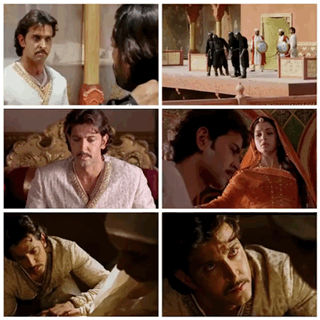
The scene wherein Jalal explains his behaviour to Maham Anga is one of the most important sequences in the film for multiple reasons. Firstly, the acting is phenomenal; emotions have always been Hrithik’s forte and what do we say about Ila Urun? We are probably not qualified enough. So, its better to just bow our heads in respect and keep quiet. Second, this is when Maham Anga is able to instigate Jalal against Jodha by feeding him false information. She shows him a container of poison that her spy had extracted from Jodha’s personal belongings earlier and lies that his wife may be planning to harm him. In reality, Jodha’s mother had given her the poison so that she could kill herself if she feared of being dishonoured by her husband after the marriage. Maham Anga also misleads him by talking about a letter that Jodha has written to Rajkumar Ratan Singh, the Rajput prince, she had been betrothed to since her childhood. This letter had actually been written by Jodha to her cousin Sujamal, who had left Amer after being denied the throne. In the letter, Jodha had requested him to rescue her from being married off to the Mughal emperor. However, she had never sent it. After finding it in Jodha’s room, Maham Anga sends it to Sujamal, to take advantage of the situation and create a rift between Jalal and his wife. Unfortunately, this diabolical ploy works because of Jalal’s blind trust in his ‘Badi Ammi’. Upon receiving the letter, Sujamal believes it to be genuine, and goes to the Agra fort at night without caring about the risk. Jodha comes out to meet him, surprised at this sudden visit, but assures him that she is happy with Jalal. To her misfortune, her husband, who has never seen Sujamal or Ratan Singh before believes the intruder to be the latter and sends soldiers to capture him. Sujamal escapes, but only after thinking that Jodha deliberately called him there to be arrested. Meanwhile, Jalal accuses her of plotting with Ratan Singh behind his back. Outraged and shocked at this humiliation, Jodha tells him that Maham Anga is the one who has caused this entire misunderstanding. When Jalal refuses to believe her, she asks what punishment he has in mind. And, he tells her to go back to her parental house! Jodha naturally feels terribly insulted at his decision, and decides to leave him and protect her self-respect! This is a wonderfully executed sequence with the two leads reacting to each other masterfully, and turning it into one of the best angsty interactions ever. This was also the moment that Ashutosh chose as the point of intermission, a sound decision obviously because to be very honest, by this time the audience was indeed in need of some food and drinks 😄😄. On a serious note, this was a watershed moment in the lives of our two lead characters, and a perfect opportunity to take a break and come back refreshed.
Any analysis of Gowarikar’s Jodha Akbar is bound to be elaborate simply because it is impossible to designate any scene from the film as unimportant or bad. It is not for nothing that we termed this film a masterpiece at the beginning of this blog. Every second of it is still a pleasure to the senses and deserves mention. However, for the purpose of your sanity and ours (not to mention the time constraint), it is vital that we take an ‘interval’ too, and analyse the second part of the movie in a separate blog. Don’t worry, we will not take too long. So au revoir as the French say ; hopefully you will bestow your good wishes upon us once again like you have till now.❤️❤️
16 notes
·
View notes
Text
What do the perfect thief, the perfect spy and the perfect rogue (or not) agent have in common? Hrithik Roshan, of course. Just think for a moment. Is it even possible to imagine anyone else as Mr. A, Rajveer or Kabir? Obviously, not!
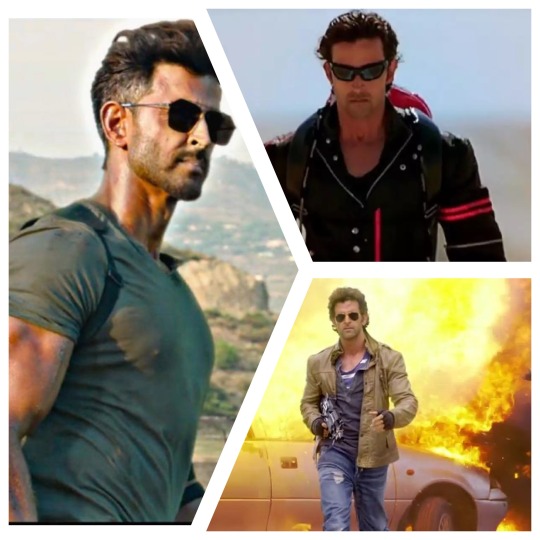
Stylized action flicks are part of a genre that Hollywood has mastered and perfected over time. Spy thrillers and heist movies involving plenty of high-level stunts and fit looking heroes have raked in a lot of moolah for renowned western studios since several decades. Bollywood’s fascination with this genre is far more recent in comparison. In India, the cornerstone of such films was probably laid by YRF with Dhoom. It was not the action that was new; Bollywood had already seen Amitabh Bachchan for more than a decade followed by other action heroes during the 90s. Rather, it was the portrayal of action that was novel in Dhoom; rarely had an action film been packaged with so much style and gloss in India. While Dhoom marked the beginning of such films in the Mumbai film industry, YRF outdid itself with Dhoom 2, which was literally bigger and better than its precursor in every frame. Finally, even Bollywood could boast of a hero, (or a ‘villain’ in this case) who a la Tom Cruise, could pull off impossible stunts with elan and make them look believable. He was also at least as handsome as the American megastar, if not more (He does beat Tom Cruise regularly in 'Most Handsome' polls conducted across the world. On our part, we have no doubt about the last part of that sentence. Just take one glance at the uber stylish Aryan, the dreamy Rajveer and the rugged, bronzed Kabir and you will understand our feelings. The scene in Dhoom 2 in which Aryan poses as a statue, all painted in white is such a joy to the eyes. Not to mention, Hrithik is probably the only man who looks breathtakingly handsome despite being covered in blood. Remember the scene where Kabir is tied up, all bruised and beaten up? Doesn’t he look like an art?).
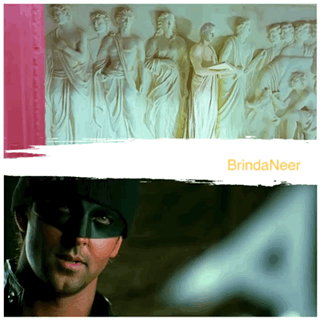
Back in 2006, when the audience first saw Hrithik as Mr. A, the famous ‘Hrithikmania’ that had originally emerged in 2000 was rekindled, and there was no doubt in anyone’s mind that Hrithik Roshan was the best, if not the only choice for such roles. Since then, he has gone on to play debonair secret service agents in Bang Bang and War (films of similar genre), thereby, magnifying our belief that if there is one star who can put Tom Cruise out of job, it is him (not that we really want Tom Cruise or anyone else to be unemployed). Don’t take us at our words. But do watch Kabir’s entry scene and let us know what you think. The man can just set the screens ablaze with his body language, attitude and swag!

We started this blog with a simple question to which we ourselves provided the correct, albeit incomplete answer. Apart from Hrithik himself, all the three characters under consideration have daring (come on! Do we really need to provide examples for this one?), charm (See how smitten Sunehri, Harleen and Naina are? Whether its making burgers for his new-found love, teaching her the significance of ‘ek din’ or wooing her in gorgeous Italian locales, Aryan, Rajveer and Kabir know how to charm their ways into people’s hearts), swagger (really? Proof required? We think not!), wit (Aryan manages to elude governments and law enforcement officials across the globe on a regular basis; Rajveer does not need anyone else to bring down a dreaded international terrorist; Kabir tricks everyone by pretending to be rogue! These things would not have been possible if they were fools, would they?), self-confidence (Are you kidding? Would any of the things mentioned in the last list be feasible without confidence in self?), exceptional action skills (Aryan does almost everything Krishh does without being a ‘superhero’. Just see Ali’s expressions when he spots him climbing up a billboard like a spider! 😂 Also, the terrific entry sky-diving scene, the bike scenes, and the waterfall scene are testimony to Aryan’s physical abilities. Rajveer and Kabir are in no way any less. The jet ski scene of Bang Bang and the aeroplane scene in War deserve special among countless car/bike chases, hand to hand combats and other mind-boggling stunt sequences in both the films) and good looks in common. Okay, scratch the last one. That is courtesy of Hrithik Roshan himself. So, we cannot in all honesty consider it as part of these character profiles. However, are these characters completely similar to each other? Or are there differences too? These are the questions we plan to address in the present blog.
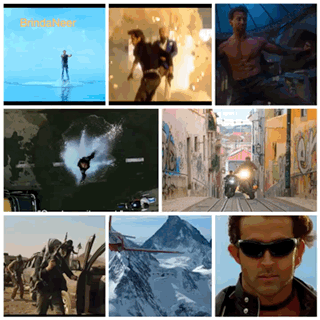
Superficially, Mr.A, Rajveer and Kabir may be viewed as minor variations of a typical larger than life fearless figure who thrives in adventure. In other words, a particularly snobbish critic may dismiss all three as ‘only gloss and no substance’. Yet, nothing can be farther from the truth! There are definitely more layers in these characters than what can be seen apparently but the nuances remain unexplained in the films. A lot is left to the imaginations of the viewers, perhaps deliberately. The mystery that shrouds Aryan, Rajveer and Kabir augments the attractiveness of their personalities, thereby justifying the astute judgement of the makers. Also, they are definitely not just two sides of the same coin despite sharing a considerable likeness of character. Oops! Sorry! Three sides of a metaphorical coin that has an extra dimension!
While Aryan is a complete loner, as is evident from his operating style, and also a textbook introvert (Incidentally, he is also the most enigmatic of them all), Rajveer probably can be called an extrovert since he clearly has no problem in interacting with strangers. Kabir is more complicated. In our perception, he is inherently an introvert although not as averse to company as Aryan. Perhaps his job makes it somewhat easy for Kabir to interact superficially with strangers and curb his natural instinct. Nevertheless, he does not let many people in his personal space, except a privileged few. Once again, this reticence may be an acquired trait due to his position in the security service. Similarly, ‘profession’ is what stops Aryan from shedding his inhibitions towards other people, except of course Sunehri, who he is in love with since first sight (which also proves his terrific judgement. After all, who wouldn’t fall in love with Sunehri at first sight? 😂😂). Is Rajveer beginning to look like the ‘odd one out’ here? Well, he is not. At least, not entirely. In spite of being the most gregarious one out of the three, Rajveer likes to keep his pain to himself. Proof? He loses no time in putting back his guard up after a momentary vulnerability in front of Harleen wherein he talks about his ‘ek din’. So, we get something else that is common among these characters- to an extent, each prefers to keep some distance with other human beings. But hopefully, we have been able to point out the differences too. Well, if you are still discontented, here is another one. Aryan is a complete romantic once he falls for Sunehri; Rajveer’s love for Harleen is more restrained due to his obligations towards the country; Kabir knows only one kind of love- the love of a patriot for the country (Of course he loves his teammates but that is again an extension of his patriotism. Perhaps, it is Roohi who is the only one outside his job setting that he begins to ‘love’. He could have loved Naina, but unfortunately, destiny did not give him the time).
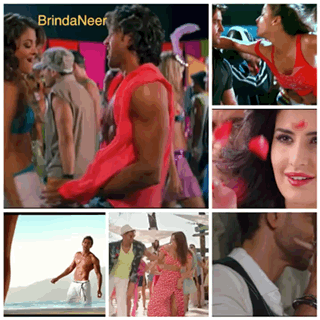
Since all our three heroes find it difficult to open up in front of others, it may be safely assumed that ‘the trust factor’ impacts their choices in life substantially. Aryan tells Sunehri that a lone thief can never betray anyone, not even himself (‘akela chor kisi ko dhoka nahin de sakta, khud ko bhi nahi’). This is such a revealing statement! He is scared of trusting people, which makes him reluctant to accept Sunehri as his partner in crime initially despite being more than impressed by her chutzpah. Even after they become a team, and he is utterly smitten by her, Aryan takes extreme precaution in ensuring that she does not see him undisguised. Well, at least till some time! The creators do not offer us any insight into Aryan’s mind, as a result of which it is difficult to gauge the reason behind his lack of trust accurately. Of course, there is a very simple explanation! He is a thief; it is only natural for him to not put his life in other people’s hands by trusting them. Nevertheless, since there is no one to stop us from imagining, we would like to suggest that cynicism is his natural instinct. That is why he does everything by himself. Naturally, he must need people for various chores, but probably even they are not aware of his true identity. Let us indulge ourselves some more and propose that this deep-rooted cynicism had been instilled within him during his childhood or youth, both of which, in all likelihood, were very lonely and friendless, at least for several years. Why? Well, a man, as lonely as Aryan, is not made in a day! Perhaps he had seen betrayal up and close. And of course, his choice of ‘job’ strengthens the need to be less trusting even more. In this context, may we pose another question? Any theory about why Aryan chose to be the perfect thief when he could have been the perfect ‘anything’? He is obviously a genius with a fair amount of formal education who could have excelled at some thing productive. He is also not a typical villain who is willing to do literally anything for money. His thirst for thrill and ambition to make his mark across the world could have been fulfilled through legal channels too. Yet, heists are what he chose to organize. So, we conclude that he really means it when he tells Jay about liking being chased! Evading the police and pulling off risky jobs (stealing only priceless artifacts) are his adrenaline boosters; the unsafety of it all drives him more and more. Perhaps he is trying to fulfil an emptiness. May be, that is why he decides not to be Mr. A anymore once Sunehri has filled his life with love and happiness. How wonderful will it be if we get a sequel to Dhoom 2 with Aryan’s backstory? There is so much scope in this plot. Just think of it please.
Unlike Aryan, Rajveer must have had a normal healthy childhood, with loving parents and an elder brother. He does not seem to have an inherent problem in showing faith in other people. Yet, he hardly ever discloses the truth, even to Harleen whom he loves. However, he is professionally obliged to do so. Also, he obviously is not ready to take everyone at their face value- once again, a job requirement.
Kabir holds an even higher position in the Indian security service than Rajveer; he is more experienced. Hence, he is harder to please. Remember how long he takes to trust Khaled? Nonetheless, even in his case, this is in all probability more a professionally acquired habit rather than an intrinsic character trait. For some reason, we perceive Kabir to have inherited his patriotism as well as sense of duty and honour from his family that was constituted of soldiers (any form of security force). Therefore, some of his habits may also havd been imbibed since childhood including part of his tendency to not trust people without testing them. On that note, here is another speculation from us- the fact that Kabir gives almost no importance to anything else in his life except work until Naina dies in front of his eyes is an attribute he has probably acquired by experiencing similar behaviour from his father or any elderly family member. No harm in imagining!
There is one other aspect that deserves to be mentioned with respect to these three characters- the quality of determination. It will be really difficult to pick the most determined out of the three. Let us just say that all three are equally stubborn; hence, equally determined too! Aryan does not give up even in the face of imminent death; the same is obviously true for Rajveer and Kabir but we need better examples for them since ‘not giving up in the face of death’ is literally what they have been trained for! But what about the confidence with which Jai aka Rajveer’s dying brother announces that he will soon be avenged? Enough proof to demonstrate his degree of determination. As far as Kabir is concerned, he says it himself. He is willing, not only to be killed, but also to kill in order to apprehend a dreaded terrorist. Yeah, we are aware that even this is a job requirement for him; unfortunately, the film does not offer other suitable examples for his level of determination, but we know it instinctively. May be War 2 will provide us with a list? Please feel free to provide examples proving Kabir’s determination (outside of work) from the film, in case we missed them.
We are approaching the end of our present blog, and it shall be incomplete without talking about the chemistry between the characters as well as the actors. Dhoom 2 was the film that launched Hrithik and Aishwarya as a pair in Bollywood. Thank God for that. Personally, we think Hrithik and Aishwarya are the best couple to have graced the Indian screen in decades. Aesthetically and acting-wise, few actors compliment each other so well as them. Take for example the ‘russian roulet’ scene which never fails to induce goosebumps in us. The moment when Sunehri aims that revolver at herself and pulls the trigger after confessing love for Aryan made us jump in our seats as we watched it the first time. Aryan’s tearful kiss makes us melt like butter even now. The interlude of ‘My Name is Ali’ provide some of the best romantic moments of not just this but a lot of films. Aryan and Sunehri aka Hrithik and Aishwarya are as elegant in the light-hearted parts as during the intense passionate bit wherein Aryan begins to train Sunehri. The scene in which Sunehri shoots Aryan after he asks, ‘Kya koi kisi se itna pyaar kar sakta hai ki uski jaan le le?’ is probably the most poetic ever in a Bollywood action film. As the camera zooms into his eyes and hers, it is impossible to focus on anything else but them during that moment. Dhoom 2 also brought together Hrithik and Abhishek for the first time. Buddies since childhood, they played foes in the film. Despite not sharing a lot of screen space with each other, it was magic every time Aryan met Jai!
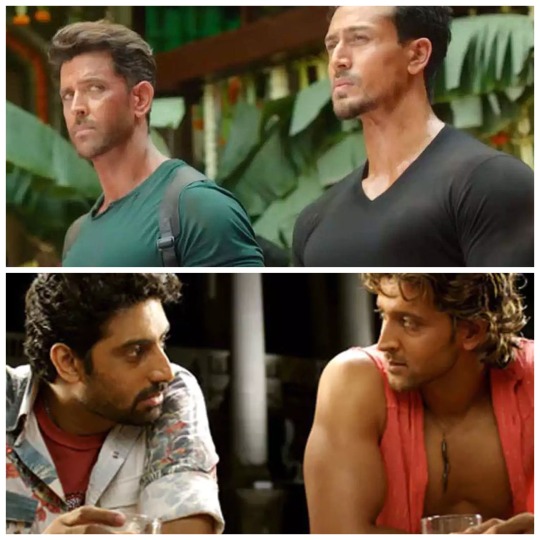
Bang Bang was Hrithik and Katrina’s second film together and it showcased the spontaneous chemistry that these two had first demonstrated in ZNMD. Who does not watch their ‘kissing scene’ on a loop? Isn’t it refreshing to see a combination of adorable humour and intensity in such a scene? Also, no discussion about Hrithik-Katrina can ever be complete without mentioning ‘Meherbaan’, a soulful song that probably provides the best recent example of natural chemistry in a hindi film.
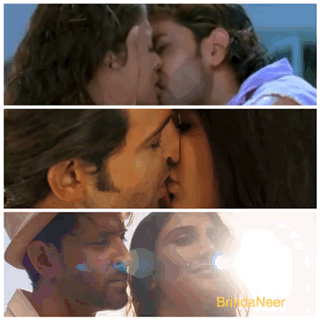
Vaani Kapur sizzled alongside Hrithik in Ghungroo but the real partnership in War was between Hrithik and Tiger, the real-life Guru-Shishya duo. Tiger’s face exudes admiration for Hrithik in his scenes as Khaled and reflects the actual feelings this man has towards his real-life idol. Every scene between the two is effortless. Our particular favourites are their humourous ‘expressive’ interaction while beating up a terrorist during a mission, and the scene where Kabir finally accepts Khaled willingly in his team. A special mention for ‘Jai Jai Shiv Shankar’! What a treat!
We have already talked about how apt Hrithik was for these characters; any further elaboration will be redundant. However, there is a moment in War when Kabir’s eyes meet with Khaled’s mother’s and the myriad expressions that fleet across Hrithik’s face are simply too exceptional to not mention. It is time to acknowledge the performances of all other leads because the films would never have been made without them. Aishwarya Rai Bachhan is flawless in every scene she had in Dhoom 2. Harleen is probably the cutest character Katrina Kaif has ever played. She is adorably innocent throughout the film. Abhishek Bachhan was predictably great as Jai Dixit; the Dhoom franchise owes a lot to this man. Tiger was such a revelation in War. He portrayed such pure innocence as Khaled, and then magically transformed into a monster as Sourabh. Playing a negative character is always difficult but Tiger Shroff is one brave guy; he was absolutely a pleasure to watch as Sourabh.
It is time to say goodbye for now. Meanwhile, why not indulge in some more conjecture? Do you ever think of what Aryan-Sunehri and Rajveer-Harleen may be doing now? We do. Aryan and Sunehri are either continuing their incredible heists after successfully duping Jai in that restaurant scene although he is close up their heels, or they have joined Jai as undercover agents to stop crimes ala Bunti aur Babli. Harleen and Rajveer may have gotten married or they meet secretly in an island every year because Rajveer is still dead to the world. Kabir? Well, we hear War 2 is coming. Hence, it does not make much sense in speculating about him. We better wait and watch! The only thing we know is that he has been having a great time with Roohi 😍😍.
Bye for now everyone. Once again, thank you from the bottom of our hearts for the tremendous love that you have showered upon us. Hopefully, we will continue to earn it. See you again with the next blog soon.❤️❤️
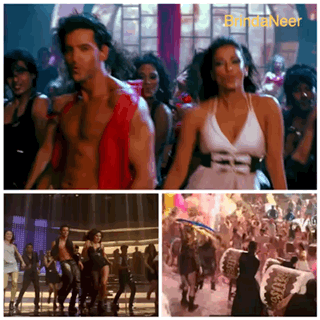
14 notes
·
View notes
Text
“Brinda: I love Superhero films. Marvel, DC and of course, our very own Krrish!
Neer: umm…I really can’t watch anything from the entire genre except Krrish!”
This is an appropriate example of a typical conversation regarding ‘superhero’ ventures between us. Shocked? What?! We already told you that our opinions varied at times! Oh! Ok! Shocked about the fact that Neer does not like the Marvel and DC universe? Well, yeah! Neer can be a bit ‘weird’ about certain things 😝! Don’t worry! Brinda loves them all❤️... However, what really matters is that both of us absolutely adore our first Indian superhero, Krrish; the reason for that is not Hrithik Roshan alone although he obviously is the primary source of our attraction.
MR. Rakesh Roshan! What a man! The sheer courage that must have been required to even dream of making a film about an Indian Superhero, all those years ago, is rare to find; it makes us salute the possessor, Mr. Rakesh Roshan again and again. At some point, fed up with relentless struggle, many among us have probably thought of giving up on our dreams. Let us take a lesson from this man and aspire for great things without worrying about the results. Only then can we achieve that which is largely perceived to be unattainable.
Technically superb with high quality VFX and cinematographically fabulous, Krrish possessed all ingredients that are usually required to make a commercially successful superhero venture. Yet, in a hypothetical SWOT analysis of the film, its numero uno strength would definitely have to be the script. We realize this must remind you of the blog on Koi Mil Gaya but please excuse us for sounding repetitive. It is not our fault that Mr. Rakesh Roshan places utmost importance on the script of a film. No, we are not saying it is his either. In fact, it is quite the reverse. Mr. Roshan’s astuteness in coming up with a crisp script with the help of a very talented team of writers is undoubtedly his best quality and that, in turn, enhances his abilities as a director, thereby making the end product not only saleable but also worthy of critical acclaim. Therefore, not surprisingly, Krrish had a sound and very believable storyline, which ultimately is the most essential element of any film. So, lets just delve into it right away!

Krrish is all about Krishna, Rohit’s son, who has inherited special powers from his father, the very ones that Jaadoo had gifted lovingly to Rohit years back in ‘Koi Mil Gaya’. Unfortunately, Rohit and Nisha are no longer alive, having died a few years after we had last seen them (😭😭). Scared of exposing her super heroic grandson to the world, Sonia Mehra leaves Kasauli and retires to an obscure but beautiful little place somewhere in the Himalayan countryside. Krishna’s face is an exact replica of Rohit’s but otherwise he is quite different from what his father used to be at this age. Krishna has superpowers that allow him to leap across mountains, fall into a gorge from the top of a high peak and yet escape unhurt, climb mountains faster than any other living being, and run faster than a horse! He is also a lonely young boy, desperate for companionship and exposure to the vast exciting world he has been kept away from. Despite harbouring a grievance towards his ‘Daadi’ for this confinement, Krishna loves her too much to be really offended. Her world revolves around him and he is very aware of it. Yet, he cannot let go of his boredom in the sleepy little hamlet he has been forced to dwell in! What a tragic irony! The very powers that had once enabled Rohit to be largely accepted within the so-called mainstream society have now chained his son, keeping him forcibly hidden from the rest of the world.
However, destiny obviously has other plans, and Krishna meets Priya (Priyanka Chopra) who is visiting India with her friend Honey from Singapore and are in his neighbourhood with an adventure group. For him, it is love at first sight. For Priya, he is initially a mystery and eventually a friend. The parallel between Krishna and Priya’s story and that of Rohit and Nisha is worth mentioning in this context. Nisha had also considered Rohit just a friend for a long time until she fell in love with him.

Despite his grandmother’s restrictions, Krishna’s powers are revealed (somewhat deliberately by the man himself) in front of Priya and Honey, who are naturally awestruck. The scenes where they and their companions mistake the superhuman Krishna as supernatural and are convinced that he is the ghost of Ramcharan provide some very effective comedy to keep the audience engaged.
After spending some lovely moments together, and getting acquainted with Krishna’s grandmother, Priya leaves, much to Krishna’s disappointment. Having grown up far from the madding crowd, away from the complexities of urbanism, Krishna is still innocent to a degree that is rare to find in the contemporary world. Priya is aware of his feelings but she does not reciprocate them despite genuinely liking him. However, that does not deter her from luring him to Singapore with false proclamations of love just so that Honey and she may save their jobs by showing off his unique skills in a television show. Quite a diabolical plan! Naturally, we were developing acrimonious feelings for Priya at this point when we first watched the film, and we are sure, so were you! However, keeping aside our concern for the ever-lovable Krishna for a while, how refreshing was it to see a flawed heroine for a change? We are definitely not suggesting that this was the first portrayal of such a female in Hindi cinema, but Bollywood had most diligently followed the tradition of glorifying female lead characters up to a very long time, and it was not completely out of fashion in the late 2000s. In fact, it is still frequently observed in television shows that are highly influenced by obsolete Bollywood themes. How many heroines can you name off the top of your head who were selfish and unsympathetic in mainstream commercial films during that decade? Yes, definitely more than what used to be in the 60s, 70s and 80s, but still not too many. Just close your eyes for a moment and think of the number of films where the ‘hero’ has faked love for the heroine due to selfish reasons (to win a bet with friends, to satisfy his own ego, for the sake of his job, etc). If you can think of such films far more easily than the ones where heroines have made similar mistakes, we have made our point. Please do not get us wrong; we are definitely not advocating such behaviour. However, our society has normalized the concept of a ‘virtuous’ female to such a massive extent that sometimes people forget we are human beings, made of the same flesh and blood as men, and capable of making similar mistakes and sins. We do not intend this blog to be a discourse on feminism by any means; yet somehow this discussion seems very relevant here.
Moving on, Krishna is elated to find that his feelings are reciprocated and wants to go to Singapore at the earliest to get permission from Priya’s mom for their marriage. However, his daadi has severe objections in this regard. The scene where Krishna lashes out in anger and accuses her of selfishly wanting to keep him to herself is one of the best enacted scenes of the movie. But more on that later. Heartbroken by her grandson’s accusations, Sonia Mehra finally reveals the reason for her apparently irrational fear, and in the process, we get to see our very own Rohit once again, although in flashback.

After Jadoo had given Rohit his powers back, he became widely known in the scientific community due to his research works, eventually attracting the attention of internationally renowned scientist, Dr. Siddhanth Arya (Naseeruddin Shah). Dr. Arya wanted to collaborate with Rohit and build a computer that could predict the future, thereby saving the world from catastrophes. To that end, Rohit moved temporarily to Singapore and worked day and night in Dr. Arya’s research laboratory. Nisha, who was pregnant at the time, was being taken care of by Rohit’s mother. The day Nisha was hospitalized for delivering the baby, Sonia Mehra called Rohit who anxiously told her that he was coming back because his powers had been used for wrong purposes. The next day, she received news of his death in a lab accident. Nisha could not bear this shock and passed away a few days later, leaving little Krishna as Sonia’s only reason for existence.
Convinced that Rohit’s death was not a mere accident, Sonia decided to keep her gifted grandchild away from prying eyes so that the same people did not try and use his powers for evil as well.
This revelation naturally mellows the agitated Krishna down and he feels guilty for having hurled harsh allegations at the person who is actually his protector and saviour; more so because she not only agrees to let him travel to Singapore but also ushers the best possible blessing upon him by giving him Rohit’s coat. On his part, Krishna promises that he is going to keep his powers hidden from all. However, that’s easier said than done, as he soon finds out. Although he manages to ruin Priya and Honey’s attempts to showcase his skills for a show, it becomes impossible for him to keep quiet when a circus tent catches fire in front of his eyes and children are trapped inside. As he dons a common mask and wears his father’s coat inside out as a cape, Krishna becomes Krrish, a superhero who does not think twice before jumping into fire to save the entrapped. The name is a shortened version of his real one and he uses it as a pseudonym so that he may keep his promise to his grandmother. However, when has truth remained hidden? As they say in Bollywood, ‘sach ko to ek na ek din saamne aana hee hoga’! Priya, who has now actually fallen for Krishna (who wouldn’t?) comes face to face with him as he emerges out of the burning tent, carrying a child in his arms. Since he is all masked up, and the surrounding is filled with smoke, she only sees his intense greenish grey eyes, and quite logically draws the conclusion that he is none other than her very own Krishna. Smart girl! Who else has those gorgeous pair of eyes in the world? Nevertheless, Krishna’s promise to his grandmother is worth more to him than admitting the truth to Priya, and he ruins all her attempts to make him confess including getting deliberately beaten up by goons to prove that he is not the superhero she thinks him to be. He also gives his identity willingly to Christian, a young man in need of money for his wheelchair-bound little sister; a pair he had already helped before by collecting money through a stunt show on the streets (a particularly touching scene).

Just when everything seems rosy in Krishna and Priya’s life, he gets to know about Priya’s lie after a chance conversation with her supposedly sick mother on phone. Priya had hitherto avoided their meeting on the pretext of her mother being sick but the latter herself exposes that lie unknowingly and Krishna is stunned by the disclosure. Hurt and angry with Priya’s betrayal, Krishna decides to leave Singapore immediately. Meanwhile, Priya comes across a clip in her own video recording of that night at the circus and realizes that her initial intuition about Krishna being Krrish was right all along. Elated, she tells the truth to Honey and also confesses her true love for him, all the while unaware that her past lies are about to haunt her soon. She also gives the tape to Honey to show it to their boss, this time not for the sake of their jobs but also for Krishna’s fame. When she comes to meet Krishna and reveals what she has discovered and then done, he lashes out at her in probably one of the best scenes of the film. His every word is justified, and she is repentant. However, Priya crosses the line when she rebukes his grandmother and throws the same allegations at her that Krishna himself had once. Furious, Krishna reveals the reason behind Sonia’s overprotectiveness to her and starts for the airport, leaving an utterly ashamed and heart broken Priya behind.

We are now in the last leg of the film. Reenter Dr. Arya, who is definitely not what he seemed like! He too is wearing a mask like Krishna, the only difference being in their intentions. Krishna has put the mask on to save the innocent while Dr. Arya wants to destroy them. He is a power-crazed egomaniac who has already rebuilt that computer from Rohit’s lab notes so that he can effectively play the role of God. And surprise surprise! To fulfill his purpose, he has kept Rohit alive. Well, barely alive at least! What actually happened all those years back was that Rohit had successfully built the computer that could foresee the future. During his time in the laboratory, he had formed a deep camaraderie with Dr. Arya’s head of security and after Rohit had finished building the computer, his friend wanted him to foresee the gender of his unborn child through it. The computer correctly predicted Krishna’s birth but it also foresaw Rohit’s death on the very day his son was born. After further exploration, Rohit realized that Dr. Arya was going to kill him so that no one else knew how to operate that computer. Shocked and distraught, he understood that he had been used. That was when he had received the call from his mother and informed her about his decision of coming back. Before leaving Singapore forever, Rohit decided to ruin Dr. Arya’s evil plans by destroying the computer he had toiled over for months., and he was partly successful. Although he managed to destroy the computer, Dr. Arya caught him before he could leave. But for the Chief Security Officer, Rohit would surely have been killed. That honest man who had genuinely become fond of Rohit saved him by reminding Dr. Arya about the password to the computer- Rohit’s handprint and retina. Dr. Arya who had already hatched the plan of rebuilding the computer kept the latter’s heart beating. But just that. This story is narrated in the present times by Dr. Arya’s Chief Security Officer to Priya who brings him to the airport and stops Krishna from leaving. Meanwhile Dr. Arya has already seen his own future in the computer. Any guesses? He has seen his death at the hands of a masked man! Of course, the man is none other than Krishna or Krrish himself. Eager to destroy every threat to his existence, Dr. Arya promptly kills Christian, the guy who had taken up Krrish’s identity at Krishna’s behest. However, when has anyone ever escaped destiny? Even Dr. Arya doesn’t! Krishna in complete superhero mode leaps across tall buildings and finally defeats his nemesis (The insanely dedicated Hrithik Roshan who performed every stunt by himself escaped a near fatal experience when a cable snapped during a stunt! As fans we are both amazed and concerned about this man’s immense humility and absolute submission to his craft. We just hope and pray that he takes care of his health since it is more important than anything else). Before dying, Dr Arya asks why Krrish wants his death. In a terrific cinematic moment, Krishna takes off his mask and reveals his face. The shock and realization on Dr. Arya’s face is evident as he breathes his last. Finally, everything turns out fine as Krishna comes home to his daadi with not just Priya but Rohit (who has now recovered sufficiently and is back to his old self) too. The film ends on a positive note with Jaadoo’s spacecraft peeping through the clouds once again as Rohit plays that same old tune which had beckoned the former and his companions to earth in the first place.
Now that we have recounted the story, a few much needed words about the actors- Rekha ji was once again at her best in the film, effortlessly slipping into the role of Krishna’s grandmother. Hrithik and her chemistry was as fabulous here as it was in ‘Koi Mil Gaya’. Priyanka was her charming self as usual. Undoubtedly, she is one of the most natural actors in Bollywood, and this film was no exception. The easy, playful chemistry that Hrithik and she shared was one of the major highlights of ‘Krrish’. What do we say about Naseeruddin Shah? Well, probably it is better to say nothing because it might be redundant. Finally, praising Hrithik Roshan is also becoming repetitive in these blogs. So, we have decided to stop it henceforth! Just kidding! At least in this life, it is utterly impossible! Brilliant in every frame, Hrithik aced the role of a superhero like only he could, his body language being as flawless as his expressions; actions as perfect as emotions. The moment when Krishna met Rohit was a proof of this man’s immense versatility and talent. Who would think that someone that perfect as Rohit could also be equally superlative as a superhero or vice versa? The scenes where Krishna lost his temper with his daadi and Priya were also among the best moments in the film. Hrithik is always so natural at portraying rage, but he never goes overboard with it. But then, isn’t that true for every emotion in the book?
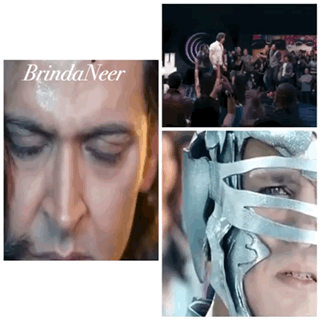
Krrish 3, the third project in the franchise continued Krrish’s saga and Rohit’s story with a vitality that characterized both its predecessors. The film featured Hrithik in a full-fledged double role and pitched him against Vivek Oberoi as Kaal who was a far tougher villain to destroy than Dr. Arya. Kaal was the quintessential supervillain, at times even more ‘powerful’ than the hero himself but ultimately destined to lose as good always triumphed over evil. In fact, this is the message that pervaded throughout all the three films- ‘Koi Mil Gaya’, ‘Krrish’ and ‘Krrish 3’. It was only natural that Hrithik’s terrific performance simultaneously as Rohit and Krrish grabbed a lot of eyeballs and went a long way in making the film a massive box-office success. It broke major box-office records and set new ones. However, Vivek Oberoi also deserves special mention in this context. His portrayal of Kaal with an optimal mix of cunning, intelligence, and cruelty earned major brownie points from the audience and definitely contributed to the mammoth success of the film. We finally lost Rohit forever in Krrish 3 and as tragic as the moment was, Hrithik’s performance was so good that we still watch it frequently despite the pain involved. Then again, Hrithik usually has that kind of impact on the audience every time he performs. Krrish was able to destroy Kaal at the end, thereby proving yet again that no matter how challenging times were, with goodness in heart and genuineness in intentions, any evil could be defeated. The assertion ‘Hum sab mein Krrish hai’ has never seemed more important than the present times. Let us all truly believe in it. We can and we will defeat this virus by our individual as well as collective efforts. So please #MaskUpIndia and #GetVaccinated. How uncanny that the plot of Krrish 3 actually revolved around a virus and vaccines! Just like Rohit and Krrish were able to defeat that virus, let us have faith in our real-life superheroes too.
P.S: At the end, Krishna and Priya had a son who also seemed to have inherited his dad’s superheroic powers. So, is there any chance of daddy Krrish in the fourth venture? Fingers crossed for that 😊😊

4 notes
·
View notes
Text
Inspiration and positivity are what the entire human race is in dire need of during these uncertain times. The present blog acquires additional importance for us because the film it deals with is possibly one of the most motivational motion pictures produced by the Hindi movie industry in the past few years. Penned by the inimitable Javed Akhtar, and directed by Farhan Akhtar, Lakshya showcased the progression of Karan Shergil from an aimless, albeit good-hearted soul drifting through life into a dutiful officer of the Indian Army. Karan's path of self-discovery was not merely an entertaining watch; it was also about the vital role that initiative and determination could play in our lives. Thrown in the midst of a world pandemic after a hundred years, most of us have lost these amazing qualities up to some degree at least, which is probably why pondering over this film in particular seems to be a productive job at the moment. Ironically, a film that several people have drawn inspiration from over the years (people had actually joined the Army after watching Lakshya) had been declared a 'box-office flop' during the time of its release. In that aspect, Lakshya resembles classics like Kaagaz ke Phool, Mera Naam Joker, Pakeezah, Jane Bhi Do Yaaron, and Andaaz Apna Apna, all of which failed to take the box-office by storm, but went on to obtain cult status among viewers later. Astounding? Definitely. Great films sometimes fail financially without rime or reason and unfortunately, the same fate befell Lakshya.
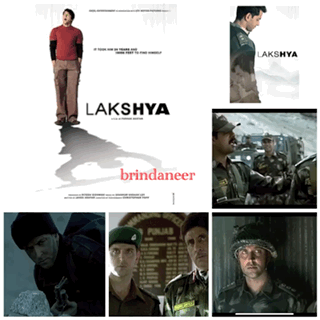
At its core, Lakshya was Karan's story and not a war film. The war and Indian Army provided a perfect setting for Karan to find his true calling. Nevertheless, intricacies of the Kargil war along with the destruction, desolation and pain that accompanied it, and which are also inevitably associated with all international armed conflicts in general, were far from being neglected in the story. A great writer is able to strike a balance between various dimensions of a plot without compromising on his actual intention, and who better than the legendary Javed Akhtar to achieve that? He was complimented by his talented son, the captain of this ship, who ably steered the film into a direction his father had envisaged while writing the script. Karan's metamorphosis from a lazy, casual college-going boy, perpetually confused about what he really wanted to do with life into a mature and responsible man was laced with humour and drama in equal measure, a strategy Farhan had previously employed while depicting Akash's journey in the epic 'Dil Chahta Hai'. Yet, the real genius lay in how different these two journeys actually were. Nobody could accuse Farhan of repeating what he had already done in his debut directorial venture.
Moments such as Karan listing his engagements of the day to Romi's (Preity Zinta) father upon being asked about his future plans in life and then literally hijacking that man's opinion on the importance of giving the best, no matter what the job was, to pacify his own father were examples of the witty humour we were talking about earlier. Of course, the actors took these scenes to a different level altogether. Hrithik’s delivery of ‘Main ye sochta hoon Dad’ after Karan had just rattled the ‘achcha ghaas kaatnewala’ lecture, and Boman Irani’s (Karan’s strict father) poker faced ‘Thik sochte ho’ in return have never failed to elicit roars of laughter from viewers till date. This wit pervaded most of the film’s first half as Karan continued his antics- the expression of his eternal confusion through the iconic ‘Main Aisa Kyun Hoon’ (apart from displaying Hrithik’s insane dancing skills through the choreography of the one and only Prabhu Deva, this sequence also aptly conveyed Karan’s inherent dilemmas), his decision of joining the Army only because another friend had promised he would come too, his disappointment upon being dumped by that friend, his ‘unconventional’ marriage proposal to Romi and his characteristic callousness as well as indolence even during his stint at the IMA were hilarious to say the least. Hrithik’s comic timing was pitch perfect in every scene, and perfectly suited for the nuanced, elegant genre of comedy that the script had aimed at.
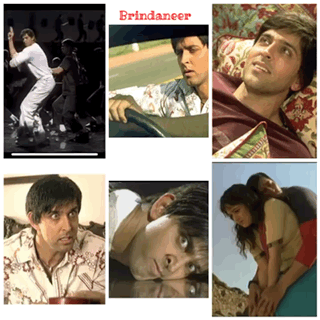
Just when we thought Lakshya was a hoot, Farhan introduced the dramatic element in it; and he did so with such subtlety and ease that the ensuing sequence of events seemed to be the only natural course for the film to take. The scene where Karan fell into the pool by sheer unmindfulness during one of his drills and got punished by his commanding officer was somehow able to generate a strange mixture of sympathy as well as laughter amongst the audience and proved to be one of the watershed moments in Karan’s story. Hrithik’s masterful portrayal of humiliation as Karan knelt in front of his fellow cadets engendered such palpable discomfort within us the first time that re-watching it remains difficult even now.

The Karan that emerged on the other side of this event was somewhat different. Staying true to his fickle-minded nature, he jumped the wall of IMA and fled home. Nevertheless, regret could clearly be observed on his countenance as he sat with his parents, head bowed in shame, forced to accept defeat in front of his father- a man, who had always underestimated him. The grievance in his eyes upon over-hearing Mr. Shergill's unfavourable opinion of him hinted not only towards Karan's underlying strong ego, but also revealed his latent desire to prove himself. The hurt ego, along with his heart, was eventually completely shattered when the one person who had genuinely believed in him refused to be a part of his life anymore. Romi, played by Preity Zinta with her usual vivacity and boldness, broke up with Karan at the same place where she had once agreed to marry him because he had failed to live up to even her expectations. For Karan, someone who had probably harboured feelings of inferiority ever since childhood because of incessant comparisons with his brother, this became the ultimate betrayal. As viewers, it was our interpretation that he never really understood Romi’s point of view; he only attributed one primary meaning to her actions- her belief in his worthlessness. Looking at this entire sequence from a neutral perspective, one might say that both Karan and Romi deserved some empathy from each other. Karan’s lack of conviction in everything he did naturally upset Romi to a point where she could not imagine spending the rest of her life with him. Can we really blame her? As far as Karan was concerned, he had to bear rejection from someone, who, he had hoped, would never judge him like his dad. Before this, he had been able to bear the brunt of his father's expectations because of the security that his relationship with Romi provided him. However, when she pushed him away, he truly hit bare ground, with no one to break the fall. The scene that followed the break-up will possibly remain one of the best pieces of emotional acting in Hrithik’s career forever. As easy as it might seem, crying your heart out on screen can actually be very difficult in practice. Hrithik obviously nailed the sobs, but more importantly, he conveyed his character’s rancour towards Romi most effectively through the unspoken hurt in his eyes, thereby suitably justifying the transition Karan would undergo next.
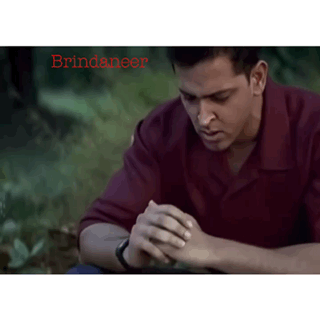
With no comfort zone left for him to turn to, Karan did what his parents, especially his father, and Romi had always wanted him to do. He grew up. He could have sulked like a petulant child and continued to live a directionless life like he had done previously. Instead, he chose to prove himself to Romi and made that his life’s goal. Ironically, Romi had disapproved when he insisted on joining the army earlier because she felt he was doing it to rebel against his father. But this was a different Karan. He was not rebelling anymore. He was trying to show Romi that he could be much more than what everyone thought about him. Sub-consciously, it was not just she who was the reason for this transformation; rather, it was both his dad and her.
Karan’s second stint at the IMA provided viewers with some of the finest moments in the film. His dedication towards learning and training, initial isolation and finally, amalgamation into the student community were fascinatingly depicted through the brilliant title song ‘Haan yahi rasta hai tera, tune ab jana hai, Haan yahi sapna hai tera, tune pehchana hai, tujhe ab ye dikhana hai......Roke tujhko aandhiyaan, ya zameen aur aasmaan, payega jo lakshya hai tera....Lakshya ko har haal mein paana hai’. Now, let us take a brief moment to acknowledge the terrific music by Shankar-Ehsaan-Loy which truly set the mood for the film. This song in particular struck a chord with us because of the simplicity and eloquence with which it expressed the inherent message of the story. The picturization was top-notch with several nuances throughout. Few moments stand out even now such as Karan passionately screaming ‘Dhawa’ during his drill, something he had been completely casual about earlier, Hrithik’s unflinching eye-contact with the CO who had previously punished him indicating that Karan was a changed man now, and Karan’s increasing camaraderie with his batch mates.
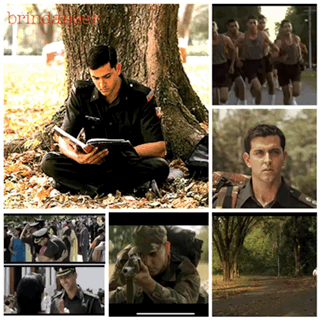
The song was followed by two important sequences, superb for the understated nature in which they expressed first Karan’s unspoken resentment towards his father, and then, his blatant grievance against Romi. In the first, Karan’s mother informed him that his dad had wanted to attend his graduation ceremony but could not ultimately, and in the second, Karan himself called Romi to inform her that he was finally a lieutenant of the Indian Army. At this point of time, talking about Hrithik’s acting probably seems redundant. So, we apologize for the redundancy (What? Did you think we would stop talking about it? 😱😱). Karan’s casual brushing away of his mother’s statement about Mr. Shergill conveyed volumes about how he had ceased to expect anything from his father; it also revealed the disappointment he felt, courtesy of Hrithik’s amazingly layered performance. Similarly, his delivery of ‘Saare faisle tum nahin kar sakti Romi’ was spot-on. It was optimally hurtful, just like it was supposed to be.
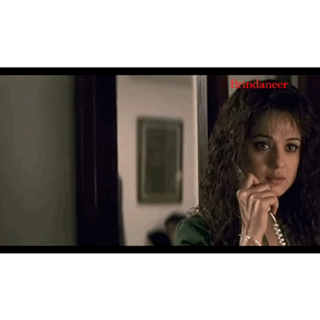
As his job brought Karan to Kargil, Ladakh, and he met his commanding officer, Colonel Damle, played to usual perfection by the enigmatic Mr. Bachchan who managed to captivate the audience completely during the few brief moments he had in the film, as well as other colleagues, the lines between proving himself to the two important people of his life and finding his true ‘Lakshya’ began to blur. By his own confession, he had never thought about the significance of being an ‘Indian’ until his senior colleague Jalal Akbar (a brilliantly natural Sushant Singh) took him to the border (pretty prophetic that Hrithik himself went on to play a different Jalal Akbar later in his career, right?). In all honesty, a considerable section of the audience probably felt the same too. The stunning Trans-Himalayan locales shot so artistically definitely added to this feeling, although any border area is usually capable of engendering such thoughts. The landscape of Ladakh has a strange haunting quality about it, and that played a substantial role not only in making the film a visual treat but also metaphorically with respect to Karan’s journey.
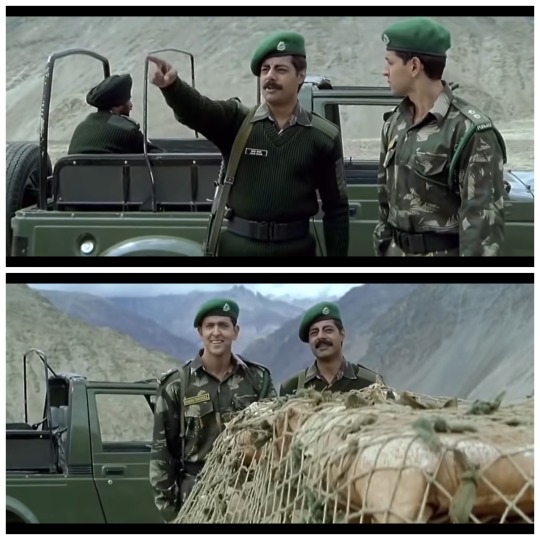
As he truly began to love his job, Karan realized that he was finally ready to let go of his ego as far as Romi was concerned. Unfortunately, Romi, after a lot of thought, and pining for Karan, had decided to move on with life, much to Karan’s shock and dismay. The scene where he stood outside the venue of her engagement and watched her laughing with her fiance was one of a kind for the lack of melodrama that usually accompanies such sequences. Its speciality lay in the director’s nuanced handling of emotions and the actor’s terrific portrayal of subtle poignancy.
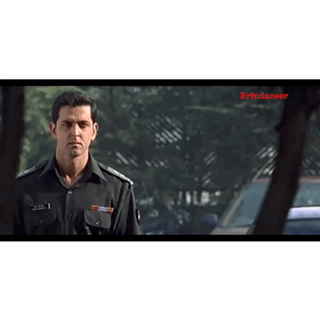
Run down and broken by the trials of his life, Karan returned home to his parents, only to receive news that his leave had been cancelled, and that he was urgently required to return to base. The moment where he bid goodbye to his parents was the first time when his father openly expressed love and concern for him, although not exactly in those words. The visible tension on Mr. Shergil’s face as he lost his cool and asked Karan to tell the complete truth was a testimony to his worry for his son who was about to go to a border area amidst serious disturbances. The part where Karan hugged his mother and left with just an uncomfortable glance towards his dad was another of those amazing subtle moments which characterized Farhan’s direction for this film. Hrithik’s discomfort and Boman Irani’s disappointment were both heart-rending to watch and as a viewer, one really wanted to reach out and give both of them hugs. A special thanks to Farhan and whoever was in charge of casting for signing Boman Irani in this role. Hrithik and his scenes were like mini acting classes that aspiring actors could take tips from.
Sometimes, it is difficult to get on with life, more so after losing one’s love forever like Karan had, but military training had instilled a sense of duty and discipline in him that was impossible to ignore. Of course, he had already begun to find a deeper meaning in his life through his job, especially after spending time with his superiors and colleagues. And, so he marched on. Had Romi seen his sense of responsibility even during a time when his personal life was in turmoil, she would have been proud. However, the realization that this was his true calling was probably yet to come to Karan. It did, in phases as he learnt about the war situation from Colonel Damle, and then embarked upon it.
If two people are destined to meet, even the universe conspires to bring them together. The same thing happened with Karan and Romi as they crossed paths unexpectedly in Kargil, of all places. The scene where they saw each other amidst a convoy of army vehicles is absolute poetry. Kudos to Preity for being so natural with her expressions always; she was brilliant in every scene, and especially here as Romi’s eyes changed from pure surprise on finding Karan there to a subtle melancholy and probably hope ( ?) at the thought of their future interactions. Hrithik, as usual, was spot-on with Karan’s ‘seeing a ghost’ expression as he moved past her, without getting an opportunity to satisfy his curiosity regarding her presence there.
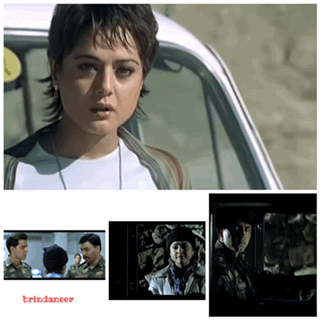
Their next exchanges were laced with intense angst, but not of the typical Bollywood kind, rather much more controlled and nuanced. The part where Karan, after knowing about the demise of his good friend Abir (from the IMA) found his other pal Saket (Abir’s closest friend) venting out at Romi requires special mention because of the seamless manner in which it shifted from a discourse on the necessity and morality of war to a fantastic interaction between the lead couple, their first face-to-face conversation since the break up. It was formal, yet intimate; mundane, yet special; filled with hope for more on Romi’s part, and discomfort as well as suppressed anger on Karan’s. This scene was followed by his a little mean ‘pata nahin’ when Romi asked him if he had decided whether they should meet or not, and his angsty ‘congratulations’ for her engagement. Of course, the poor guy had no idea that she had broken it off after finding out that her fiance who was apparently a highly motivated successful individual was also a narrow-minded chauvinist. The irony of life! Once again, kudos to the genius of Farhan Akhtar. Without even mentioning it, he managed to point out the difference between Karan and Rajeev, and it was clearer than ever why Romi loved Karan. Remember ‘Maine aj tak tum mein koi choti baat nahin dekhi’ ? However, Romi obviously did not explain the truth to Karan. It was truly frustrating at times to see these two souls so much in love with each other, and yet unable to let go of their stubornness. Nonetheless, the frustration could be borne because of the brilliant intensity of their scenes and the wonderful chemistry these two shared. Truly, we do not talk enough about Hrithik and Preity’s amazing on screen bonding. We really should!
Karan eventually found out about Romi’s broken engagement from a letter his best friemd Ashu had sent him a while back. Hrithik’s expression of shock portrayed the extent to which the news had unsettled Karan. Incidentally, just when love had given him a second chance, Karan encountered death more closely than ever. After an initial victory during the first battle (the one in which he had saved the life of a senior officer, and killed opponents for the first time; also possibly the one where he began to realize that serving his country had started becoming his passion), Karan and his battalion were massively defeated in the second and several lives were lost, including his close colleague, Captain Akbar’s. The scene where Akbar succumbed to his injuries in front of his best friend, Dr. Sudhir (played by the late Abir Goswami, may he rest in peace too) who tried desperately to resuscitate him while motivating the gasping man with remarks such as ‘aam khane jana hai na’ can make people cry anytime without manipulating their emotions or forcefully tugging at their heartstrings. In fact, this was true for every battle sequence in Lakshya, which made it one of the best war movies Bollywood had ever made. Notably, the script treated every character with sufficient respect including even the ones who had screen times of just a few minutes. Everyone had a well-crafted story arc, however small it might be but integral to the movie. Most importantly, not for one second did we feel that Karan had taken up the screen space of others.
The best example for this was provided by the great late Om Puri ji, who played the role of Subedar Pritam Singh. Of course, if you have the privilege of casting an actor of his calibre, your can rest assured of the outcome. Acting is at its best when it does not feel like enactment, and not many actors are more natural than Om Puri ji! Appearing on screen for not more than four to five scenes, he delivered some of the most profound dialogues in the film. He explained to Karan how a soldier knew better than anyone about the destructiveness of war; yet he had no other option but to be a part of it. When Karan asked why wars took place, he pointed out that human greed had drawn boundaries upon the earth’s surface and if it were in their hands, men would partition the moon too. How true it rings, especially now. People are actually talking about ‘making life interplanetary’. If it ever happens, countries are going to fight about demarcating territories there.
Moving on! Excuse the length of this blog please! A film like Lakshya has so many subtle intricacies that it becomes impossible to leave out scenes. But don’t be impatient please. We have almost reached the end of our ‘Lakshya’. A few sequences still deserve mention. First, the iconic ‘Tum kehti thi na Romi meri zindagi mein koi lakshya nahin hai?’ The defeat accompanied by the loss of close friends and colleagues had augmented Karan’s determination to win but our hero had also finally discovered his passion, his true calling. In moments when such epiphanies occur, is there anything else left to do other than crying? Probably not. That was exactly what Karan did. As usual, Hrithik’s performance elevated the quality of this scene, like so many others. The part where Karan pledged to Colonel Damle that either he would execute the mission successfully, or he would not come back alive was again equally impactful because of both Hrithik and Mr. Bachchan. The way Colonel Damle looked at his officer after this momentous declaration conveyed the immense pride, gratitude and grief he felt at that moment. Truly, Mr. Bachchan needs no dialogues to express emotions. His eyes do it all. And the same is true for Hrithik too.
Now, its time for our favourite scene in the movie. You guys must be thinking that we agree on everything. Well, we do agree a lot, but disagreements occur too. However, there was no disagreement on this one. We think its a lot of other people’s favourite too. You are right! We are talking about the scene in which Karan called his dad. This was on the night before the final mission- a mission that was near suicidal. Upon seeing his colleague Vishal take off his engagement ring and put it in an envelope, Karan finally acknowledged what he was running away from; something that he had buried deep down in his sub-conscious- his conflicted emotions towards his father. The knowledge that he might no longer be alive for a resolution made Karan pick up the phone and dial his number. Here is an anecdote in this context. When Boman Irani started shooting for his part in this sequence, Hrithik’s lines were being read by an AD, and Mr. Irani could not get his shot right because he was not able to get the proper feel. Acting is a lot about reacting, and the non-impactful delivery by the AD hampered Mr. Irani’s shot. Finally, the person in charge of the sound came to his rescue and Hrithik’s dialogues were played in audio (Hrithik’s part had already been shot by then) to which Boman Irani reacted. And what an outcome. This is the true mark of a great actor; he not only excels himself but helps others soar too. And what an honour to have helped an ace actor like Boman Irani! The performances by both in this scene were superlative and manage to leave us with lumps in our throats even today.
In his first ever heart-to-heart with his dad, Karan confessed that he had always disappointed his father and told him that he was aware of it. In return, his dad who initially had thought Karan had called his mom, finally told him how proud he was of him. A salute and heartfelt gratitude to all the parents out there who send their children to serve in the security forces so that civilians can live in peace. The smile on his son’s face was proof that he could die happy. The tears in both their eyes expressed the craving they had towards each other; the dejection that Karan had always felt upon being ‘ignored’ by his father was replaced by the understanding that his father had always loved him; the pain on Mr. Shergill’s face portrayed his disappointment for waiting so long to convey his love to Karan- so long that there was a chance he might never see him again.
Having poured his heart out to his dad, Karan finally set out to achieve his Lakshya of recapturing Point 5179 and hoisting the Indian flag on it, but not before a much needed conversation with Romi. What an amazing bond these two shared. Karan did not need to tell her explicitly that he knew about her broken engagement; she did not have to tell him that she still loved him. They just knew. Her ‘to phir main zindagi bhar intezaar karungi’ was far more intense than a conventional ‘I love you’. The beauty of this scene lay in the complete lack of melodrama which one usually associates with Bollywood scenes of this kind. No over the top background score, no hysterics, not even a hug! And the fact that they wanted to hug, but could not (because Karan’s seniors were waiting) made this moment even more poignant. Hrithik and Preity were the epitomes of subtlety here. The frustration of not even being able to touch each other before Karan left for a life threatening assignment was so tangible that even the audience imbibed it. Seriously, why did not Hrithik and Preity work more? They were so attuned to even each other’s silences!
The final mission proved the truth of Romi’s words. ‘Jis din usne decide kar liya ki use kya karna hai, aap dekhna wo kahan se kahan pohochta hai’. Indeed, Karan reached the peak of success, literally and metaphorically. The mountain-climbing scene deserves a special mention here. It was so perfectly done that the only comparison that comes to mind is the famous rock-climbing sequence in ‘The Guns of Navarone’ by the iconic Gregory Peck. And in all fairness, Captain Mallory only climbed a cliff; Captain Shergill had to climb a peak of the Trans Himalayas! Jokes aside, both scenes shall forever remain goosebump- inducing. Karan, obviously hoisted the Indian flag, and just in time. Boy, did he make Colonel Damle proud or what?!
Thanks to our friend Mita for this wonderful VM .
There is a saying that everything works out in the end, and if it does not, it is not the end. It indeed did happen that way for Karan. He found his goal, and achieved it too. As he walked out of that elevator, and hugged his dad finally, we surely did feel contented. And who said Mr. Shergill did not know his son? Well, he might have taken time, but now he understood him better than most. When Karan’s mother asked if they could go home, he objected. Go home? What NO! Karan had to go and fulfill his other 'Lakhshya’, right?
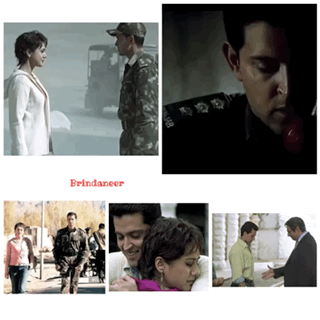
How wonderfully thoughtful of Romi to stand at a distance from Karan’s parents, wanting to give them the private space that they needed! Actually, kudos to the director for his sensitivity; such subtlety is not something that we frequently see in Bollywood. So thank God for ‘Lakshya’. Just like Karan’s story ended on a positive note as the camera focussed on him and Romi, holding hands, finally embracing each other, ready to step in to a new chapter of their lives, we also end this blog with a bit of optimism.. Let us all hope and pray that ‘Hum Jeetenge Ye Baazi’ (modifying Javed Akhtar’s line a bit) on behalf of every Indian, and every person in the world dealing with this pandemic.
P.S. This blog is dedicated to all the front-line workers (doctors, nurses, other medical personnel, medical suppliers, delivery executives, grocery storekeepers, and all other emergency personnel) who put their lives in danger everyday so that we may survive. Please know that you are always in our prayers. Also, let us all hope that no one remains shy of masks and vaccines anymore. Those are the most effective ways of countering this virus. Stay safe everyone!
1 note
·
View note
Text
Finally, its time for some magic! Or may be we should say 'Jadoo'.
We remember hearing first about Koi Mil.Gaya when Mr. Rakesh Roshan announced it, possibly during the Zee Cine Awards ceremony of 2001 (the year when Hrithik swept up all awards for KNPH). By the time it released, a few years had passed which was natural considering the grandeur and scale of the film. Mr. Rakesh Roshan astutely conceived of a novel idea in the form of ET meeting Forrest Gump and gave us something Hindi cinema had never seen. Let us take a moment to deeply acknowledge this man, whose razor sharp mind not only engendered such a unique concept but also gave him the vision and stamina to actually turn it into reality.
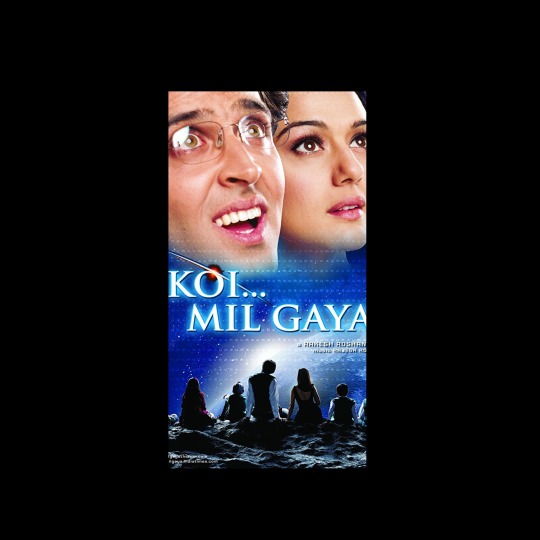
Koi Mil Gaya was undoubtedly going to be one of the most ambitious projects Bollywood had seen till then, and the greatest challenge the Roshans had yet embarked upon. It would have been no trivial feat if they had managed to be even moderately successful in such a difficult venture. Instead, they broke box office records, and passed with flying colours.
The fact that Hrithik Roshan is one of those rare actors in bollywood who has a terrific following among kids is widely acknowledged at present. However, it was probably John Abraham, who first pointed it out, some time after Koi Mil Gaya. He said that a 'Superstar' was someone who could attract children, thereby pulling entire families into the theatre and in his opinion Hrithik was the only one like that in his generation. More than a decade later, his statement still holds true. And 'Koi Mil Gaya' was where it all actually began. Although KNPH had catapulted him into stardom literally overnight, KMG was the film that began endearing Hrithik to kids. This frenzy reached a peak after Kkrish but more on that later. Hrithik literally played a child in the movie, and he did it with such perfection that kids immediately considered him as their best friend. Last time the Indian audience had seen a similar performance was years ago when the wonderful Sri Devi ji (May she rest in peace) had played the role of Reshmi in the splendid 'Sadma'. Not surprisingly, critics compared Hrithik's performance in the film with hers, and every one of them unanimously agreed that both performances were flawless.
Hrithik changed his voice, his way of speaking, his looks and his body language so much that he actually looked like a little boy. He was optimally sweet, innocent, and annoying, just like you would expect a naughty child to be. Some of his best scenes were with the ever glorious Rekha ji who played his mother in the film. Rekha Ji has often claimed that if she ever had a son, he would be like Hrithik. Offscreen, they actually share a similar relationship and probably that fuelled their amazing mother-son chemistry on screen. The other fantastic partnership in the film was between Hrithik and Preity Zinta. Rohit and Nisha were one of the most unconventional couples of Bollywood. And also, one of the cutest! ☺☺

Nonetheless, the best pair in the film was undoubtedly Rohit and Jadoo. Hindi cinema has been responsible for presenting us with a number of iconic friendship duos over the years. Mohan-Ashok, Anand-Bhaskar, Somu-Vicky, Vijay-Sher Khan, Jai-Veeru, Vijay-Ravi, Kishan-Bishan, Ram and Rahim, Amar-Prem, Munna-Cirquit constitute quite an elite club and Rohit -Jadoo definitely made it to the list.
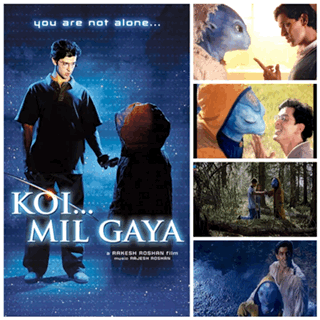
The kids who played Rohit's mates also deserve a mention here. Hrithik surely must have had a gala time while shooting scenes with them.
However, it was the script and direction that really binded the film together. We have often seen films fail dismally despite having a stellar cast, and the reason for such failure is almost always a lacklustre script or uninspiring direction. Fortunately, Koi Mil Gaya was perfect in both these departments, as a result of which Hrithik could literally soar above every other performer that year.
A few words need to be mentioned about the music of the film although it needs no introduction. The songs were a rage then; they are equally hummable now. Sadly, present bollywood rarely makes such melodious music anymore! The good old days...Ah! But let us not lament. Instead, why do we not just relive those moments for a while? Hrithik dancing in Rohit’s character remains one of the best bits of acting he has done in his life.
Coming to the scenes! Yes, the most exciting part 😉! It is really difficult to choose favourites from a film like Koi Mil Gaya. Even so, we decided to give it a shot. Lets start with the moment when Rohit discovered that he had not been promoted with his friends. Didn't the sudden disappointment on Rohit's previously excited face make you want to go and give him a cuddle? 🥺 Also, don't even try to tell us that you did not cry when the goons broke his scooter and later hit him with the basket ball leaving him battered and bruised or when he pleaded to Lord Krishna for more strength ('Thodi shakti mujhe de do Bhagwan) 😟🥺😭😭.
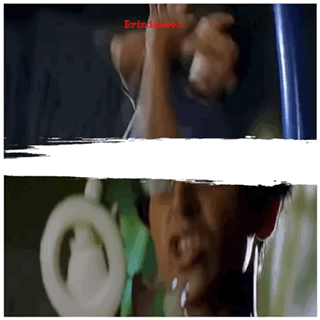
And what about the scene in which he was angry and upset about Nisha not being his 'girlfriend'? Hrithik and Rejha ji in intense emotional scenes are always a treat to watch. The scene where Jadoo met Rohit and Nisha for the first time and healed Rohit's scars with his touch after that iconic hand extension moment attracted silent awe from the audience in theatres then and remains goosebump- inducing even now. No discussion about Koi Mil Gaya can ever be complete without mentioning Rohit's splendid transition. We got the Greek God on screen for a few scenes in which he generated hysteria among the audience that had been viewing him as a son or younger brother for most part of the film. What an actor! The ending was bittersweet for many. After all, Rohit did revert back to his childish self as a price for saving Jadoo's life. But, Jadoo gave him his powers back! And thank God for that. How else would he go to Singapore and meet Dr. Siddhant Arya later in his life? Our Superhero Kkrish would not have a villain to kill in his debut film! My God, worse could have happened. Kkrish would have never become a superhero if Jadoo had not given Rohit his powers back! So well done Jadoo 🤗🤗

OMG! This blog has been running over pages! Excuse us for the length 😁. But one of us did watch KMG from the first row, all the while straining neck on the first day of its release. The other one watched it comfortably the first time ( tickets were prebooked, of course) but got a sore neck after watching it from the front row a second time, and also gave the same to the entire family. However, no one complained. So, now you know what this film means to us. Thank you for your love, encouragement and support. They keep us going. Adios Amigos till the next one 😉😊
6 notes
·
View notes
Text
Hey peeps! Our next blog entry chronicling Hrithik's filmography is not ready yet. Meanwhile, we have something we would love to share. We started this adventure with a short ode to KNPH. So, today we are posting something we wrote two years back. This was technically our first write-up! Unfortunately, it got lost in the ocean of other brilliant tweets. If you have time, do give this a read, and share your feedback with us. Also, please excuse the redundancy. This was written a couple of years ago, and kindly read it in that context . Plz scroll down and visit Brindaneer’s tumbler page to be able to see the gifs and videos ♥️🙏🏻
Today, when Super 30 and War have had tremendous success, and the famous Hrithikmania is back, it only seems apt that one should talk about the movie that generated this mania in the first place.
KNPH gave us a much needed 'Hero'. After what seemed like ages, the audience had finally got an actor who could portray innocence, sweetness, hurt, grief, and rage with equal intensity and brilliance on the silver screen. Hrithik Roshan, like he always has, pushed boundaries right from his debut project, refusing to be clubbed either as a romantic lead or an action hero. Instead, he could do both, and more. And the whole nation fell in love with him, as much as the characters he portrayed.
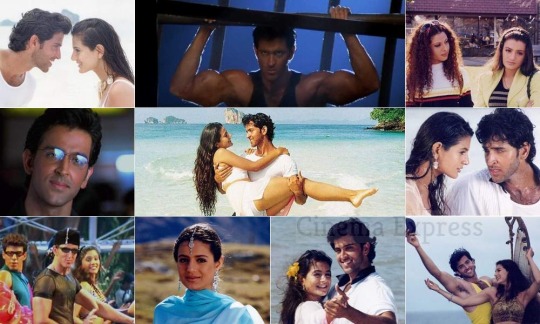
Hrithik was also among those rare stars who could act as well as he looked, and had a screen presence that could easily make Tom Cruise envious. He was exceptional in KNPH, aided by his prudent father, Mr. Rakesh Roshan, who left no stone unturned to craft the perfect launch vehicle for his son. No actor could have dreamt of a better debut. Hrithik got to play every emotion in the book through Rohit and Raj, and did it so convincingly that it was easy to believe in the different identities of these two characters.Rohit was naive and cute while Raj was the perfect charmer, stylish and suarve. On one hand, Rohit made people cry as he looked with a gut-wrenching helpless gaze at his attackers, knowing well that he wouldn't survive, before his bike fell into the sea. On the other, Raj, right fron his iconic entry scene, managed to persuade the viewers that Rohit would be avenged and allowed them to heave a collective sigh of relief. Of course, they all gasped at Raj's hotness first 🥵🤪😝🤣.
We also take this opportunity to thank Ameesha Patel for her vibrant performance as Soniya. The chemistry between the lead pair was one of the most important reasons for the film's success. Ameesha was perfect as the naive and bubbly Soniya and complimented Hrithik in every scene.
Rohit had the melody of 'Chaand Sitare', the fun of 'Pyaar ki Kashti' and the unadulterated blissful romance of 'Kaho Na Pyaar Hai' to his disposal.

But Raj had the 'Ik pal ka jeena' to his credit, along with the passionately soulful 'Na Tum Jano Na Hum' and the rocking 'Sitaron ki Mehfil to play with. A special mention to the talented Mr. Rajesh Roshan who was at his melodiius best here.

We remember people arguing about who was better- Rohit or Raj....and ultimately realizing that both were played by the amazing Hrithik.
Hrithik Roshan. What do we say. Naam hi kaafi hai. Right? Suffice it to say that he came, he looked, he acted, he danced, he romanced, he fought, and he conquered. If you want to know how much he conquered, just answer one question truthfully. Did you sing or want to sing 'Haan tumse pyaar hai' when Raj sang 'Kaho Na Pyaar Hai' at the final concert? If you did, well that is your answer.
4 notes
·
View notes
Text
We are back! And what a time to be back! We hear that Hrithik's 25th film has finally been locked and it is going to be none other than Vikram Vedha. So congratulations, or as the French say, 'Felicitations' to every #Hrithikian out there. Since Hrithik will be reuniting with Saif Ali Khan after 19 years in a film, we found it apt to devote this blog to the first film they starred together in, 'Na Tum Jano Na Hum'.. Also, we have tried something different here, but let us delve into that later. First, it is time to reminisce Rahul.
The name Rahul is so embedded within our minds in association with SRK that everytime a screen character is called that, a lot of us tend to form an image of him. And SRK's Rahul is usually flamboyant, extrovert and blatantly romantic. However, in NTJNH, Hrithik's Rahul was more introverted and less exuberant. He seldom made grand romantic gestures, and when he did, he hid them. This was a different Rahul and Hrithik made him his own. In the process, he made an otherwise weak film relatable, obviously, aided by the always dependable Saif Ali Khan.
NTJNH suffered from some pretty glaring flaws as far as the story and script were concerned. Falling in love through letters might seem dated to some; nevertheless, that was never our problem. However, we do have a difference of opinion regarding the procedure they chose to write those letters in. 🤣 One of us thought it was not too ancient a technique; the other was in favour of a more modern method.
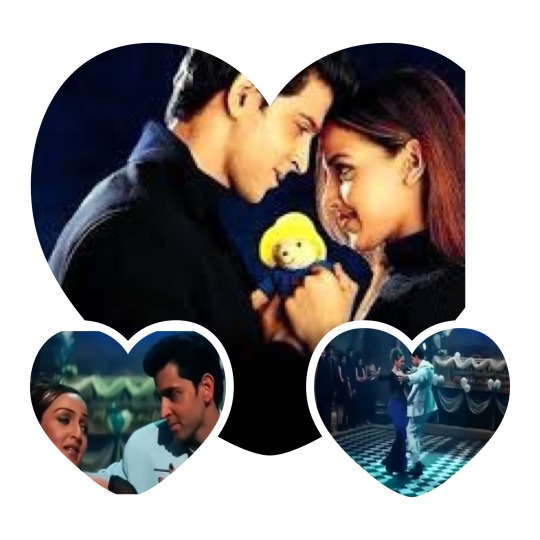
That said, we did agree on the other points. For instance, it seemed a little out of character for Akshay, an out and out cassanova, to fall so much in love at first sight with Esha that he became absolutely desperate to marry her despite knowing well she was in love with someone else. It seemed totally contrived so that it could serve the purpose of the triangular love story. Nonetheless, NTJNH had several positives too, and none more than its male lead character, Rahul.
Incidentally, Hrithik made a very similar film which released right after NTJNH. You guessed right. We are talking about Mujhse Dosti Karoge. So, now we come to the 'different' part that was mentioned at the beginning of this blog. Since these two films were so similar to each other as far as the stories were concerned, we thought it would be a good idea to amalgamate the two. It also seemed like a great opportunity to pick out the contrasts in Hrithik's characters and analyse them. So let us embark upon the journey of sketching the characters of Rahul and Raj (oh! Even Raj is an iconic SRK name which Hrithik left his unique imprint upon!)
The stories of both the films were so similar that we often feel had Mujhse Dosti Karoge released sometime later instead of the same year, it would probably have fared much better at the box office. If the point of consideration is film quality, Mujhse Dosti Karoge was perhaps a better film overall. It was better packaged, more slick and had the magic of Hrithik-Rani together.
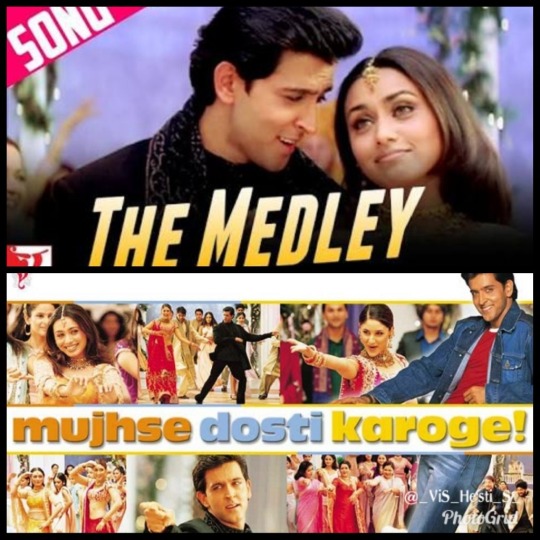
Nevertheless MDK had its share of contrivances as well. Who can forget the clueless parents of Raj and Puja and the ever oblivious Tina who never understood that those two were madly in love with each other, although anyone with an iota of sense would have guessed it immediately? Well, thanks to them for their ignorance since we did get some pretty intense Hrithik-Rani moments in the film.
Although NTJNH lacked the slickness of MDK which is an important part of a commercial entertainer, it had an inherent honesty about it, which is always more attractive than the former. In that sense, it probably could have been a better film than MDK, but for certain technical issues. And most of that honesty, if not all of it, was generated by the character of Rahul.
Rahul was the noblest side in the triangle between Akshay, Esha and him. An introvert with a golden heart, ever ready to sacrifice his happiness, and even the love of his life, for his best friend and the family that cared for him. Interestingly, this same role was played by Rani as Puja in Mujhse Dosti Karoge, while Hrithik's Raj was as different from Rahul as he could possibly be.
Raj was assertive, stubborn, and at times outright cruel, but only because he loved as much as Rahul did. While Rahul chose to pine quietly, hidden from everyone, Raj refused to let Puja destroy her own happiness and his. In this, he resembled Esha to some extent, although he was far more headstrong than her. And here, we must acknowledge the bundle of talent that is Hrithik Roshan.
pic credit google
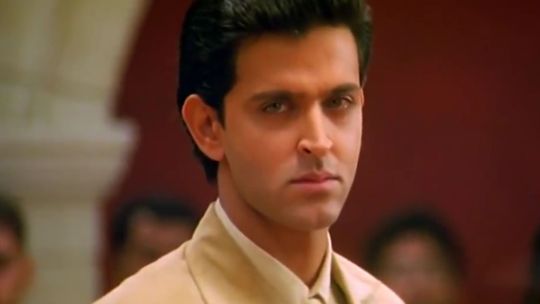
Rahul's innocence was reflected in his eyes in NTJNH and those same gorgeous eyes flashed with anger and hurt when Raj found Puja willing to give him up. His breathtaking helplessness as Rahul during the revealation of Esha's identity, grief in 'Tum' and 'Ja Sanam', frustration and finally painful submission in the scene with Akshay where he wanted him to tell Esha that he did not love her, in juxtaposition with Raj's anger upon discovering Puja's lie, determination in not letting her sacrifice their love, jealousy everytime Rohan came in Puja's vicinity, and finally mad passion during blatant proclamations such as 'Main Tina ko shaadi ke mandap mein khara chod dunga' (I shall leave Tina standing alone at the wedding) proved yet again that bollywood had finally got a star who could captivate audiences with his acting skills even in commercial entertainers.Here was an actor who could be both vulnerable and strong, and never seem out of place with any of it.

Of course, this discussion shall remain incomplete unless we mention Hrithik-Saif and Hrithik-Rani's on screen chemistry.
Hrithik and Saif exuded a natural bonding and ease with each other on the screen which made any scene with the two enjoyable. Their comic timing was perfect, without going over the top.
The serious scenes were so well done on either side that they left us wanting for more.
Thank God for Vikram Vedha!🤪
And what do we even say about Hrithik-Rani? Well, suffice it to say that in our opinion, the fact that these two have never worked together again is one of the greatest tragedies of modern bollywood.
gif credit unknown

Let us just hope that someone out there is writing a script which will be worth both their time.
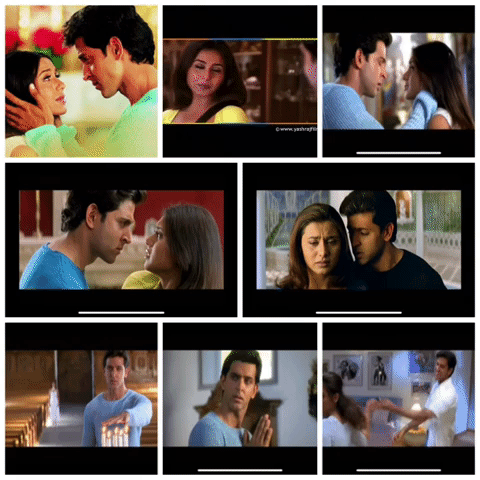
On that note, we end this blog in the hope that we have been able to satisfy our readers. We also pose a question to you- whose perspective, in your opinion was correct? Rahul or Raj? 😉
Last, but in no way the least, we wish this entire fandom and the man himself #HrithikRoshan a very very Happy Holi. May this festival wipe away the greys of Covid and spread colours of joy amongst all of us in days to come.

2 notes
·
View notes
Text
In our last blog entry, we mentioned how Hrithik Roshan and Kareena Kapur had charmed the audience through their on screen chemistry even in a poorly scripted film like Yaadein. However, it was as Rohan and Poo that they truly sizzled onscreen. Who can forget the heat in 'You are my Sonia'. Unfortunately (again), they did not get a better film to do so. Kabhi Khushi Kabhi Gham or K3G as it is more popularly known, was at the most, a mediocre film, often bordering on the ridiculous.
It was a predictable story of damaged relationships and their healing in an ultra rich family (Amitabh Bachchan's character talked about buying more helicopters, for God's sake). By the way, did anyone understand what business the Raichands actually did? In that case, please do let us know. Also, wasn’t it just cute that Rahul Raichand (SRK) walked away from home with literally nothing and ended up owning a huge bunglow in London, of all places, ten years later? If only all of us were so fortunate with regards to money!
Also, why would anyone dance on the streets of London to Vande Mataram when they were supposed to be heartbroken at having just found out about the long term estrangement of a beloved brother from the family? Oh wait! Of course, it was Karan Johar's way of showing off just how amazing HRITHIK can look. So, no complaints there! Yes, we accept, we are shallow! NOT ASHAMED!!🤪
Please excuse us for the above paragraphs; K3G did have some genuinely good moments, and most of them involved our man! For instance, the scene where Rahul met the grown up Rohan for the first time was well done, and all credit belonged to the actors. Both Shahrukh and Hrithik were perfect in portraying the inner turmoil that each other felt. Rohan's moments with his DJ (Farida Jalal) were also heartwarming, and far more natural than the over the top Nandini-Rahul scenes. The scene between Rohan and Yashvardhan in which Yash slapped his son is our personal favourite. It must have taken a lot of courage for a young actor like Hrithik to do that scene with someone like Mr. Bachchan! And he was excellent, never once going over the board in it.
The Rohan-Poo moments, however, were the most entertaining bits of the film along with the parts where the two brothers bonded. A special mention for Kareena Kapoor- it was not easy to play someone as irritating as Poo and make her funny and genuinely sweet. So well done Bebo! Hrithik and Kareena's on screen chemistry was truly at its peak in this film. Kareena had never looked so stunning and Hrithik was at his sexiest. They should have been given more screen time and space in K3G. The scene before the prom in which Rohan pointed out that Poo was wearing the wrong shoes was a testimony to the magic these two brought when they came together on screen. It was hot, sexy and hilarious at the same time. We thank Karan Johar for coming up with some great unconventional romantic sequences between them.
On another note, we thought Rohan went to London to persue MBA. At least, that was what he told his father. Instead, we saw him going to college in super luxurious cars (no wonder Rahul asked him to sleep in one), sing, dance, play rugby, confess his love for Poo at the prom night, and finally get married! Of course, he did bring the family together. So, bravo ROHAN! Nevertheless, guess MBA really took a backseat, ha? For God's sake Karan! At least, you should have shown him carry a book! But perhaps, we ought not to expect all this from a Karan Johar movie which usually is all about escapism.
Despite all its flaws, K3G has a special place in our hearts, not just because of Hrithik-Kareena's terrific chemistry, but also because this was the first Hrithik Roshan movie that we, 'Brinda' and 'Neer' went to see together at the theatre! Who knew we would end up becoming soul sisters and writing blogs about him years later. Thank you Hrithik for playing such an important role in our friendship, and hence, our lives. We owe you so much.♥️🤗On that note, bye readers.
Hopefully, you are enjoying reading our blogs as much as we are having fun writing them. We are extremely thankful to the entire Hrithik Roshan fandom for accepting us with open arms and showering us with so much love and warmth in such a short time. Lots of love to all of you. We will be back soon with the next one.
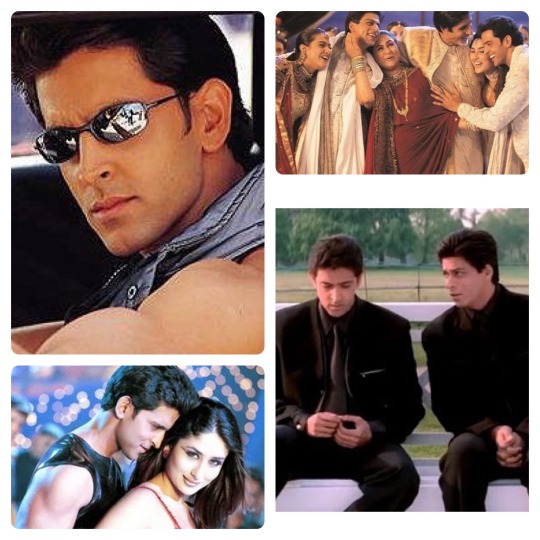
4 notes
·
View notes
Text
Hey Hrithikians! Remember Yaadein? Well, of course you do. We do realize that this film does not rank among his best endeavours. Nonetheless, Yaadein was the first movie where the audience got an idea of what Hrithik-Kareena could do on screen. So, it would be a shame to neglect it.
Yaadein had an enormous pre-release buzz in anticipation of Hrithik-Kareena's first joint venture, and it was one of a kind because they were already being touted as the hottest couple of the new generation, even before the audience had seen them perform together. Although some people were skeptical about this, Yaadein managed to expunge all doubts about this screen couple. Unfortunately, that was the only thing the film managed to do. Hrithik and Kareena both were let down by a script that had somehow lost its way in the middle. Despite that, Hrithik's performance, in an otherwise forgettable film, was worthy of mention. The industry was beginning to realise that finally an actor who had the capability of making a dull film watchable by his sheer screen presence and attitude had arrived. Sadly, he was given very little actual material to show his acting chops, but whenever he got a moment, he shone. Take the scene where he mimicked Jim Carey for example. It was a tricky thing to do, especially because the subject of mimickry was the inimitable Jim Carey. However, Hrithik pulled off the scene with elan and grace, never once going overboard with it.
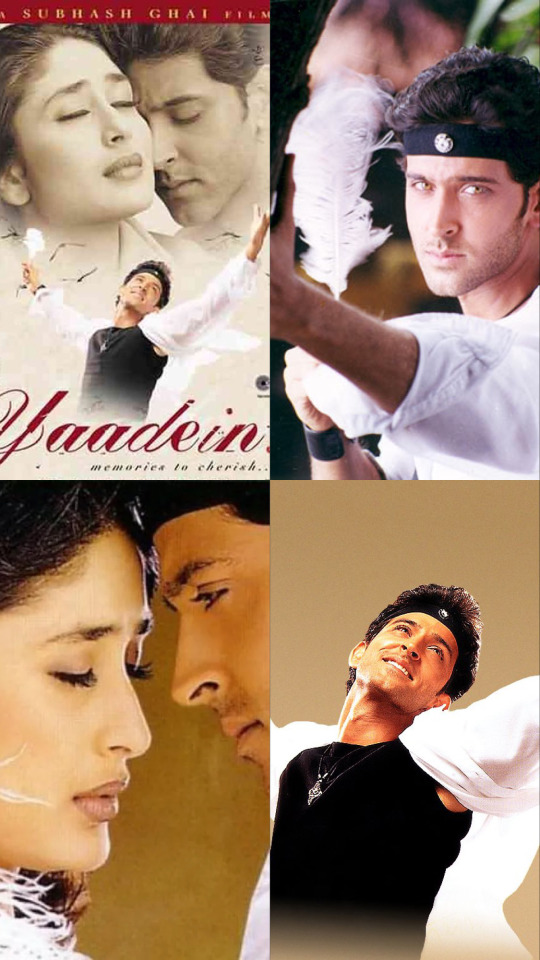
The only other saving grace in the film was the on screen pairing between the leads. Hrithik and Kareena could stand together silently and yet share a sizzling chemistry which could not be negated by even their most blatant critics. So, cheers to 'Yaadein' and Mr. Ghai for bestowing upon us their magic..🤩
1 note
·
View note
Text
We are back with Blog No. 3 and guess which film we will be writing about this time! Yeah, not a difficult guess at all. We Hrithikians know the timeline of his films by heart.
When Hrithik Roshan had signed on to play Altaaf in Mission Kashmir, he was just another newcomer in bollywood.
By the time, the film released, he was a phenomenon after being catapulted into fame overnight by Kaho Na Pyaar Hai. Also, aided by his terrific and subtle performance in Fiza, he had established himself as not just a star, but also as a sensitive and intelligent actor. Naturally, there were a lot of expectations from Mission Kashmir. Whether or not the film lived upto expectations is not ours to say because we believe it completely depends upon the individual perceptions of viewers. However, Hrithik proved his worth yet again, and this fact remains undisputed even today.
It was particularly challenging to play Altaaf after Amaan, considering both characters were similar to a certain extent and Altaaf could easily become redundant. And yet, the very first time Hrithik graced the screen as Altaaf, the audience knew this was a completely different character. Hrithik made Altaaf more ruthless than Amaan. While Amaan had a lot of repressed anger, Altaaf was all about wild fury. He even completely altered his body language so that Altaaf never resembled Amaan. Altaaf had far more confidence, walked with bold strides, his head always held high, proud in the belief that he was right,unlike Amaan who was always stuck in a moral dilemma.

Mission Kashmir also marked the beginning of a very special on screen bonding between Hrithik and Preity Zinta which definitely elevated the overall quality of the film itself. Hrithik went on to work with Preity in two more films, incidentally two of his all time best. The ending of the 'jheelon ka shahar' song was almost poetic and the chemistry between the two as they looked into each other's eyes was undeniable.
In conclusion, despite the criticism levelled against the film from several quarters, Mission Kashmir gave us some treasures which we Hrithik fans shall cherish forever. And we express our wholehearted gratitude for that.
1 note
·
View note
Text
A very warm welcome to all our readers and thank you to everyone who showered us with love as we embarked on this new journey. We hope to have you by our side as we progress further.
Since we Hrithikians are all eagerly waiting for the grand release of our HERO's 25th film, why don't we take a trip down memory lane and reminisce the wonderful moments the man has given us by celebrating some of the most remarkable films of his career? It seems like a good idea, right?
Our first blog entry started asan ode to his first film 'Kaho Na Pyaar Hai'. So, logically,the next in line must be 'Fiza'. Incidentally, today the world is celebrating International Women's Day and this film particularly resonates with a lot of sentiments most of us women have wanted to convey since a long long time.
Fiza, in its essence, is the tale of a young woman who refuses to bow down to the pressures of society. Alarmed by her undaunted spirit, misogynistic caretakers of the said society, try to bully or control her at every point, only to return empty-handed. The woman in question, Fiza, is played to absolute perfection by one of the most talented among the younger Kapurs, Karisma.
Determined to find her long lost brother Amaan, Fiza breaks every traditional barrier, steadfastly refusing help from self- aggrandizing politicians and ultimately succeeding in her venture. Amaan is played by a young Hrithik whose innocence in the first half of the film is perfectly juxtaposed to the repressed anger and discontentment in the second half. Before commenting on his extraordinary performance in the film, we would like to thank him for accepting this role in the first place. The fact that he agreed to play a supporting character in a women-centric film in the early 2000s is a testimony to the man's character and let us all applaud him for it.

As far as his performance is concerned, it is possibly one of his best ever. The helplessness and fear he portrays in the scenes where he is trying to save his life is palpable and makes his transformation into a young man angry at what happened to him all the more believable. Two scenes stand out in particular. In one scene, Amaan tries to stop two local goons from disrupting the activities of a harmless 'laughing club' when one of them calls him a murderer. What follows is arguably the best 'angry young man' scene in our times. Hrithik's body language and facial expressions depict his character's suppressed rage with magnificence and leaves the audience in awe of his talent. The other scene is the one in which Amaan shoots the aforementioned goons and leaves his family forever. Before leaving, he turns around for the last time to look at them, a thousand emotions etched upon his face and brimming from his eyes, expressing Amaan's agony, regret, helplessness and acrimony all at once without uttering one single word. Fiza remains one of Hrithik's most memorable works till date. It is probably also Karisma Kapur's career best performance and another fantastic opportunity for the massively talented Jaya Bachchan to showcase her extremely natural acting prowess.
As we sign off, we leave you with one comment by Fiza, which is probably something that every woman should bear in mind. 'Hum kamzor nahin hain' (We are not weak). On that note, we wish all the women out there a very happy International Women's Day, although we strongly believe that every day is our day.
2 notes
·
View notes
Text
To every woman out there be proud of what you are not what you should have been or what others want you to be... 💃🏻💃🏻✊✊💕💕
1 note
·
View note